#context: addressing own traumatic backstory
Explore tagged Tumblr posts
Text
The A Court of Thorns and Roses (ACOTAR) fandom is one of the most divided literary communities today. It’s not just a matter of which characters people ship, but rather a deep schism over how people interpret the characters, themes, and real-life issues embedded in the story. The arguments go far beyond typical fandom disagreements and have morphed into full-fledged debates about morality, trauma, and the human condition. At the heart of these conflicts is the tendency for fans to project their own experiences and values onto the characters, creating new "canon" versions of the story to fit their narrative. What makes this even more significant is that ACOTAR isn’t just fantasy fiction—it touches on real issues like domestic abuse, sexual coercion, trauma, and mental health. These are not fictional concepts; they are lived experiences for many people. By brushing these topics aside or simplifying them, the fandom risks doing a disservice to the people who see their own pain mirrored in the pages of these books.
"It’s Just Fiction" — A Dismissive Take on Real Issues
When people say "it’s just fiction," they’re missing the point. Fiction, especially in fantasy, is often used as a mirror to reflect real-world problems. In ACOTAR, we see characters grappling with trauma, mental illness, abuse, and recovery—things that real people face every day. It’s not simply a story of faeries and magic; it’s a story of survival and the human struggle to overcome deep-seated pain.
Take Rhysand’s actions, for instance. Under the Mountain, he subjects Feyre to what can only be described as sexual coercion, making her dress in revealing clothing and sit on his lap while drugged, all under the guise of "protecting" her. In the real world, this would be considered sexual harassment or even assault. The argument that he was forced into these actions to protect her doesn’t erase the trauma it inflicted on Feyre. Fans who brush this off as a romantic plot device are ignoring the very real dynamics of power, consent, and coercion that exist in abusive relationships.
Similarly, Gwyn’s backstory, though not heavily detailed, strongly implies that she was gang-raped by Hybern’s forces during the war. The fact that this is left as an undertone in the series, not explicitly addressed, doesn’t make it any less important. Sexual violence, like what Gwyn endured, is a topic that has far-reaching emotional and psychological consequences for survivors. Yet, in some corners of the fandom, these moments are glossed over in favor of debating which romantic pairing is better.
Tamlin: Abuser or Victim of Circumstance?
Tamlin is one of the most hotly contested characters in the series, and it’s easy to see why. His actions in A Court of Mist and Fury—where he physically confines Feyre, restricts her movements, and isolates her from the outside world—are textbook examples of domestic abuse. There’s no argument that what he did was wrong. But there’s also context that complicates his character and, in some ways, makes him more sympathetic than he’s often given credit for.
Tamlin was traumatized by the events Under the Mountain, forced to watch helplessly as his people suffered for fifty years. He was powerless, and that sense of impotence likely contributed to his need for control once Feyre returned to the Spring Court. He was terrified of losing her, and that fear manifested in controlling behavior. Does that excuse what he did? Absolutely not. But it provides a context that many readers seem to ignore. Tamlin was also suffering, and he lacked the emotional tools to cope with his trauma in a healthy way.
Feyre, too, was suffering, but neither of them communicated effectively, and their relationship deteriorated as a result. Both were deeply broken, but instead of healing together, their trauma pulled them apart. Some fans take this complexity and reduce Tamlin to a one-dimensional abuser, ignoring the fact that many abusers come from places of deep pain themselves. Others take it too far in the opposite direction, defending every action he took. The truth lies somewhere in between: Tamlin was an abuser, but he was also a victim of his own unresolved trauma.
Rhysand: Savior or Manipulator?
Rhysand, on the other hand, is often seen as Feyre’s savior, the one who rescues her from Tamlin’s abuse and shows her how to be strong. But the fandom’s lionization of Rhysand ignores many of his own toxic behaviors, particularly his emotional manipulation of Feyre.
While Tamlin physically trapped her, Rhysand’s control was far more insidious. He isolated Feyre mentally, ensuring that the only people she trusted were members of his Inner Circle—people whose loyalty ultimately lies with him. Over time, Feyre’s connections to anyone outside of Rhysand’s immediate orbit are severed. Lucien, who had been a close friend, is gradually pushed away, and Feyre is left with no one to question her relationship with Rhysand.
This emotional isolation is a form of manipulation that can be just as damaging as physical confinement. Rhysand controlled the narrative around Feyre, making sure that she only saw the world through his lens. This is most evident in A Court of Silver Flames, when he instructs his Inner Circle not to tell Feyre about the dangers of her pregnancy. He withholds vital information about her own body, taking away her agency and reducing her to a bystander in her own life. The fact that Mor, Cassian, Amren, and Azriel all follow his orders without question only reinforces the power imbalance in their relationship.
Many fans excuse Rhysand’s actions because he’s portrayed as the "good guy" in contrast to Tamlin. But when you strip away the romantic lens, Rhysand’s behavior is just as controlling and manipulative, albeit in a different way. The fact that Feyre wasn’t physically confined doesn’t make his actions any less problematic.
The Creation of a New "Canon"
Given the complexity of these characters and the morally gray areas they inhabit, it’s no wonder that parts of the fandom have taken to creating their own "canon" versions of the story. Fans rework characters’ motivations, rewrite key events, and even create alternate universes to fit their preferred narrative. In some ways, this is a normal part of any fandom; people create headcanons and fan fiction to explore different possibilities within the world. But in the ACOTAR fandom, this rewriting often feels like a necessity rather than a choice.
Pro-Rhysand fans, for instance, downplay or outright ignore his more problematic actions, painting him as the perfect mate for Feyre. On the flip side, anti-Tamlin fans erase any nuance in his character, labeling him irredeemable and unworthy of any sympathy. It’s as if the original narrative can no longer be accepted as it is because it doesn’t fit into a simple good vs. evil framework.
This rewriting of canon can be harmful because it erases the complexities that make these characters human. Tamlin is not just a villain, and Rhysand is not just a hero. Both characters have committed acts of abuse, but they also have their own traumas and struggles that inform their actions. Ignoring these complexities simplifies the narrative in a way that doesn’t do justice to the story’s deeper themes.
The Seriousness of ACOTAR’s Themes
The divisions within the ACOTAR fandom aren’t just about ships or character preferences; they’re about how seriously the themes of the series should be taken. Domestic abuse, sexual coercion, trauma—these are not just plot points to be dismissed as fiction. They are real, painful experiences that people face every day.
Feyre’s experiences with both Tamlin and Rhysand reflect different forms of abuse, and neither should be diminished. Tamlin’s physical control was overt and obvious, while Rhysand’s emotional manipulation was more subtle but no less damaging. Both forms of abuse are real, and both deserve to be addressed with the gravity they warrant.
Similarly, Gwyn’s implied assault is a reflection of the horrors that many survivors of sexual violence face. Her story is not just a subplot; it’s a reflection of the very real trauma that many women endure. Dismissing these moments as mere fiction invalidates the experiences of readers who may have lived through similar pain.
Conclusion
The ACOTAR fandom is divided because the series itself is complex, filled with morally gray characters and real-world issues that demand serious consideration. By rewriting canon to fit personal narratives, parts of the fandom are erasing the very complexities that make the story impactful. Domestic abuse, sexual coercion, trauma—these are not topics that should be brushed aside or simplified. They are reflections of real pain, and they deserve to be treated with respect and understanding. Both Tamlin and Rhysand are flawed characters, and both engage in abusive behaviors, though in different ways. Acknowledging these complexities is essential to understanding the series as a whole, and it’s something the fandom, as divided as it is, must come to terms with.
#acotar#anti feyre#anti feyre archeron#honestly in this post she's a victim so ill go easy on her this time🤣#anti rhysand#anti rhys#anti mor#anti cassian#anti ic#anti inner circle#anti sjm#anti morrigan#anti sarah j maas#feyre acotar#acowar#tamlin#pro tamlin#meh tamlin#pro nesta#sorry tam tam cant do much to protect you this time🥹😞#pro lucien#the only real one in this whole book
66 notes
·
View notes
Text
Part 3 (part 1 & part 2)

Only his fourth month on the job? Oh he’s new new, that’s interesting! And explains why he’s taking this so bad, poor baby
I have to say this also puts that whole stealing the truck thing in a different context. From the way they were talking I was under the impression he had a long history of doing things like that (like he had been working with them for a year or two), but he just started working there so it probably was the first time he did something so dumb. He fucked up once Bobby let it slide, he did it a second time he fired him. Oh my god he got fired after four months on the job
It was deserved but still. It also makes sense that he was so sorry about everything and said he realized in that moment how much he cared for the job.

Oh baby no don’t say that. Yikes.
He’s taking the guy’s death so hard and it’s clear he’s angry because he wishes he could have saved him, but going to his funeral and telling his sister it’s his own fault he died that’s just… oof

Yeaaah, that’s pretty much what I expected after what Buck said. Still hurts tho
This episode has been brutal on Buck

I LOVE how Bobby handled this. He knew immediately what was off but didn’t address it while on the job and with a person’s life on the line. Too often this kind of shows do exactly that to up the tension, but it always takes me out. This reaction just feels more realistic to me.
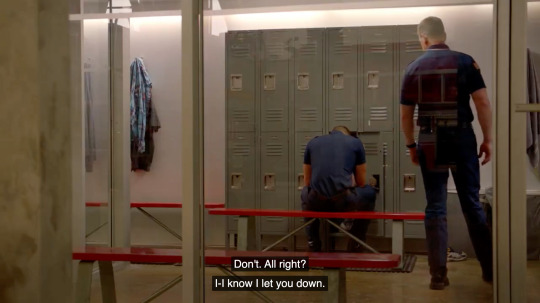
And now they address it! Love it.
Also “I know I let you down”? They really want me to feel for Buck, huh? Cause it’s working

LOVE this scene where they communicate without talking. I’m actually really liking this episode in general! It already feels like a step up from the first one.
It probably has to do with the much more realistic calls and discussions they are having, they’re more my cup of tea



Buck tried out for the Navy SEALs, interesting tidbit of backstory. I like when info get sprinkled in like this, instead of being dumped all at the same time when a storyline requires it.
Also really liked the explanation of something as horrifically tough as the navy seals giving him trouble not for the physical torture of it all but because of the emotional repression required
If Buck is one thing it is a caring person who takes things at heart. Makes sense he dropped out because he couldn’t be just a machine

This is Buck’s character in a nutshell. Wanting to be cool and tough yes, but most of all wanting to help.
I have to say it’s interesting to see which characters they are focusing on and developing more in these first two episode. Bobby is probably number one, closely followed by Buck and Abby. Maybe it’s all those Bs in their names lol
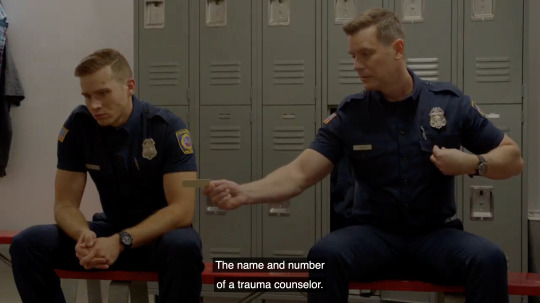
Talking about going to therapy after a traumatic event? In a tv drama? IS THIS A FUCKING MIRACLE?
I’m shocked, these shows -almost every show actually- usually pretend they’ve never heard of therapy so they can keep their characters traumatized and the tension high

You and most men, honey. It’s cultural upbringing
Also, that’s an extremely attractive therapist… are they going to get together later down the line? I hope not

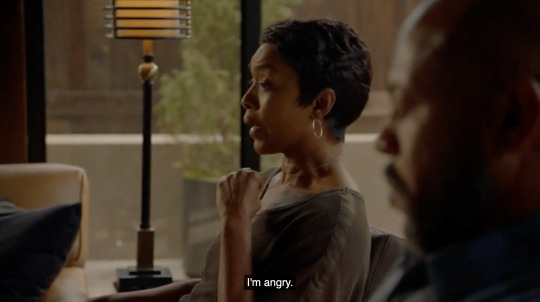
Wait what? We just… cut away?
Alright, I get it. They’re going back and forth between Buck’s therapy and Athena and her husband’s.
I got really confused there for a moment lol

So her main grievance is that Michael made her feel like a fool and not that he lied to her for decades.
….
Actually, I love that lol. It makes sense with her character: as a proud black woman on the force, she probably has had to use her confidence as a shield for quite a long time. The last thing she wants is show everyone that she was blindsided and “fooled” by her own husband


Oww that’s actually really sweet. When she’s out of her uniform she shows a much more compassionate side. I like that the show is drawing this difference very clearly
It also makes the whole “I always knew you were gay” trope (which I usually hate) a little bit better in this case



And we’re back with Buck! I have to say I’m not loving this back and forth, I forget what they were talking about by the time we switch back. The talks on their own are really well done which is why I don’t want to lose any pieces
This also makes more sense: they have lost people since Buck joined but it was more along the lines of “we got there and there was nothing we could do”. Now that I think about it didn’t a woman jump in the first episode? But in that case Buck wasn’t directly involved. This was the first time they got there in time, he got involved, did everything right and the guy still died. It probably feels very unfair (like “I did everything right, why didn’t he do his part?”)

Okay Michael has my attention now! I didn’t really care about him in the first episode, I don’t know why. He just felt kinda… off? His behavior just came off as weird to me. Too forcefully happy and positive. It’s okay to be happy because you finally feel comfortable enough coming out, but you’re also an adult and know this change won’t be easy on your children right away and might take some time getting used to. He was acting like he expected everyone to be over the moon for him and celebrate right away (I understand wanting to be accepted but you’re basically telling your children their parents are getting a divorce, pump the brakes).
This conversation makes me like him a lot more tho, peels back that mask of forced optimism and reveals some of his hardships
Also he has a boyfriend!!! Things get spicy


I was wondering when we would get here! Buck definitely blames him which is a natural response/defense mechanism to that kind of traumatic event. It’s also true that there may be a million different reasons why that guy decided to let go and we’ll never truly know. Sometimes not knowing is what makes us get stuck, prevents us from moving on. But we do need to move on anyway. I wonder how they’ll go about this

…
This is not what I was expecting
And now they’re having sex… why do you do this to me? It was going so well, I actually let myself hope they wouldn’t do this. It was an empty dream, if there is a young attractive woman in a show then she’s going to have sex, no matter how unprofessional
“I feel so much better” yeah because you used sex to feel better in the moment and avoid taking a deeper look at the underlying problem.
Is this trying to hint again at Buck being a possible sex addict? I’m still confused about that
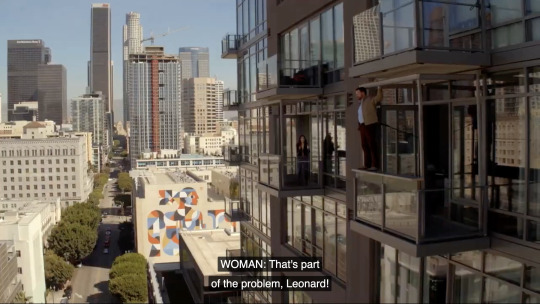
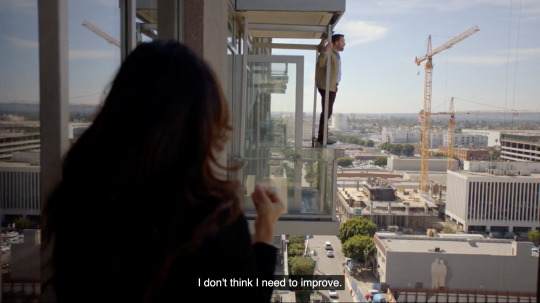
Is the rope attached to the guy in the show or is that for the stunt and was left in?
It’s not present in the next scene so definitely a stunt rope that wasn’t hidden! I like when I can catch small mistakes in shows
Also this whole scene was hilarious

I love Bobby’s approach to the whole situation. The first time he noticed Buck’s hesitation he didn’t push, talked to him privately and gently, recommended he talk to a therapist and now he starts to push him (still gently) to get over his fear. Loving Bobby’s character so far
Aaaaand I need to make a part 4 because I reached the pics limit 🥲
Will definitely need to change some things around for next episode so I don’t do so many parts
23 notes
·
View notes
Text
I think most who know me around here have figured out I have no interest in the "ship war," and aside from simply not wanting to invest my energy in anything of the sort, that lack of interest comes from a willingness to simply see how everything plays out in the books.
If you've followed me for a while, you know I obviously favor Elucien while still loving Azriel and thinking he'll be a wonderful partner/mate to someone in the near future. I talk about my preference for Elucien through long-term compatibility, potential, and through the lens of the writing itself.
When we talk about either pairing, I would apply the same logic to the significance of Elain's choice if the roles were switched in the story.
If it was Azriel who ended up having a mating bond snap with Elain and Elain was into Lucien, I would still have the same expectation that she get to know the former before making a life-altering decision.
SJM has built up the combination of mating bonds and love as the golden standard within the ACOTAR world and has alluded to the pain that lingers if it's rejected--how it never fully goes away.
Again, this isn't real life. Elain would not owe that experience to Azriel, nor would she owe him her time and effort.
But the author who chose to write that bond into the story does owe the readers when it comes to addressing it.
Let's say it's Azriel she won't give the time of day.
Azriel who's asleep upstairs while she brushes fingers with Lucien and almost kisses him.
Azriel who gives her thoughtful gifts that she does everything to avoid acknowledging.
Let's say she ignored every attempt Az made to get to know her and never even tried when we're told repeatedly he's feeling the hurt, pain, and longing caused by that bond.
We know Az: know how fearless, brave, and sweet he is, and how fiercely he protects his family and the people he cares about. Az has wonderful qualities that have been built up over several books.
If Elain rejected him without ever learning of those qualities, I would be extremely disappointed in the complete lack of story between them. The snapping of something that important and instrumental in their lives only for her to make a decision with next to no information or having faced her own internal conflict about the bond.
We want the happy ending for Azriel, whose love for Mor was never returned, had a traumatic, dark past, and who wants to experience what it means to have the most elevated form of partnership.
Of love.
That's the key about this argument: we want Elain to make a decision when she has all of the information to do so, not less than half and hiding from the rest. That is where she grows; where her love for either one of them becomes fulfilling.
This is my same argument with Lucien as well, just with his own backstory and characteristics plugged in. I want her to get to know him and to make her choice with all the information at her disposal.
It's not and never will be a desire for the other male or Elain herself to suffer or go without love. Unless he just completely goes off-the-rails and out-of-character, you'll never hear me putting down Azriel or pitting him against Lucien, and vice versa. I'm not at all anti-Elriel--my preference just leans the other way, and I think Az has his own powerful bond and love story just waiting to play out.
My only request is if Elain rejects her mating bond with Lucien, then they both end up being freed of it entirely so that neither has to suffer. They've been through more than enough and deserve a happily-ever-after.
Azriel does, too.
My suspicion given the context clues is that a bond might snap into place between Az and Gwyn (and I love the idea of them together), but that's another post for another time.
#acotar#elucien#elain archeron#lucien vanserra#azriel#a court of thorns and roses#if this has typos I wrote it at 1 am this morning#opinion post
25 notes
·
View notes
Text
Bendy: Secrets of the Machine Thoughts
Putting them under a spoiler cut for readability
So far, there is a lot of intrigue regarding GENT and their role, as well as the potential return of the Nightmare Run characters.
GENT's involvement so far as been more on the sidelines in the games. It's implied they have similar issues with the supernatural, and they are running experiments with the ink the Machine produces, the books also backing this up with the reappearance of Archie Carter. However, with the new character. Riley Wells, introduced, it creates a more interesting layer to this, in that it is implied that she was recruited by GENT shortly following her dismissal from JDS. Now, if she is a villain or a victim is up for debate. It could be that they hired her as a test subject similar to Archie Carter and her metamorphosis was just far more severe as a result of the traumatic experience in her childhood, or perhaps she provided the specs that ended up producing a real-life version of "Bloodwheel", the more monster-y version of Gaskette that even gets a whole song in Riley's flashback.
Riley's story is also interesting in that it provides a canon explanation for why the Nightmare Run toons are more monstrous, though it really only does so for Gaskette. She's never shown drawing any of the other bosses, just him. Which makes me wonder if maybe she was part of the character design for only him, and the others are all going to get their own stories later on in the game. I really do hope they go this route, mostly because it would be a nice callback to the no longer available Nightmare Run, and you could have some real fun with the bosses 'backstories', depending on how involved you want to be.
Can think of a few things immediately off the bat: Chester being another example of a childhood fear turned into a debilitating trauma, except involving someone who has thalassophobia strong enough to rival H.P. Lovecraft. Kind of paves the way for a lot of spooky imagery involving the ocean, ocean life, and ink.
Dewey at first seemed a little comical to think about in this context, after all, a fear of librarians seems extreme, though thinking more on it my thought is that he's the product of a different type of emotional stuckage. Instead of a fearful person, perhaps Dewey was created by a very angry person, someone who had a lot of trouble controlling their temper and would frequently blow up at seemingly minor issues. After all, Dewey's main character trait seems to be his temper, as we remember from his character card that he has a disproportionate reaction to Bendy knocking over some books. Granted, between the fact that the exact quantity of books is never mentioned, and a cartoon being a cartoon, it makes me wonder if Bendy might not have knocked over a few books, but more likely a few stacks or even whole shelves worth. I mean, what's funnier, a few books coming down or the library getting a spontaneous remodeling job thanks to a careless patron?
...It's probably not so fun for the librarian, but you get my point. So, potentially, we have someone who has a temper problem creating this character as a way to offset their issues. It might just be less helpful and creating a bit of a feedback loop, where they're constantly ruminating over their problems rather than addressing and moving on from them.
Canoodle was another one that eluded me a bit, though there are two potential driving forces that could have fueled his creation. On one front, junkyards aren't exactly friendly places sometimes, and it would be easy for some sort of accident to happen that could produce some sort of negative association, though there is also the fact that a sentient can being in a junkyard creates this almost weird mental image. You'd think that'd be a dangerous place for him, and this is somewhat proven true if you beat him in Nightmare Run, as he's promptly crushed and disposed of. So, perhaps a preoccupation with death, or a person who is constantly cheating bad or dangerous circumstances? It's something, and it could definitely be interesting played out if that's the direction they're planning on going with this.
There are also plenty of other fun moments and little easter eggs for fans, so either way, we do get something fun. I would honestly be over the moon if they did something for all of the Nightmare Run toons though. Gaskette is a good nod, and Riley's backstory intrigues me given the circumstances, and especially the apparent involvement with GENT. Kinda makes me wonder if they're, in a sense, keeping tabs on people who were associated with JDS, people who maybe would have some stronger ties to the art being produced there and potentially have a bigger reaction when the ink is used on them.
It's something to think about, for sure. If anything, I'll enjoy using these puzzle pieces in my own work.
#bendy and the ink machine#bendy and the dark revival#bendy: secrets of the machine#bendy: the cage#bendy: secrets of the machine spoilers#bendy in nightmare run#gaskette#dewey#canoodle#chester#binr dewey#binr#binr gaskette#binr canoodle#binr chester#batim#batdr#bsotm#bostm spoilers#things to think on#character thoughts#do have a good amount of batim aus#lore injection would be a fun thing to play with
24 notes
·
View notes
Text
This comment is acutally right!
Why is giving your OC a "dark past" so important?
Character Depth:
A dark past adds complexity and depth to your character, making them more multi-dimensional and interesting.
Motivation:
A character with a dark past often has strong motivations that drive their actions throughout the story, providing a compelling narrative.
Conflict and Tension:
A troubled past can create internal conflicts within the character, as well as external conflicts with other characters, adding tension to the storyline.
Resilience and Growth:
Overcoming a dark past can showcase the character's resilience and capacity for growth, making their journey more inspiring and relatable.
Reader Empathy:
Readers may empathize with characters who have faced adversity, making it easier for them to connect emotionally with the story.
Plot Twists:
A dark past can serve as a source of unexpected plot twists, keeping readers engaged and intrigued as they uncover the layers of the character's history.
Mystery and Intrigue:
A character with a mysterious or troubled past can create intrigue, encouraging readers to invest in the story to uncover the secrets behind the character's history.
Character Arc:
A dark past often sets the stage for a powerful character arc, allowing the character to evolve and transform over the course of the narrative.
Realism:
Characters with flaws and traumatic experiences can feel more realistic, as people in real life often carry the weight of their past experiences into their present actions.
Memorability:
Characters with dark pasts are more likely to be memorable to readers, as their struggles and triumphs leave a lasting impression.
Exploration of Themes:
A dark past can be used as a vehicle to explore and address themes such as redemption, forgiveness, and the impact of trauma.
Backstory Integration:
A well-crafted dark past can seamlessly integrate with the overall plot, providing context for the character's choices and behavior.
And tbh it´s a great way to deal with your own shit! My therapist recommended, 'Let your book characters suffer, so that you don't need to put all the stress onto yourself.'
Dark past ideas
A dark past can be really intresting in books .here are some ideas:
Mysterious Orphanage Escapee: A character who grew up in a sinister orphanage and narrowly escaped its dark secrets.
Traumatic War Survivor: A soldier who witnessed unspeakable horrors on the battlefield, leaving deep emotional scars.
Secret Criminal Past: A reformed criminal who once led a life of violence, but is now trying to make amends.
Kidnapped as a Child: A character who was abducted at a young age and endured years of captivity before escaping.
Tragic Family Betrayal: A character who was betrayed by a close family member, leading to a life filled with distrust and pain.
Cult Escapee: Someone who managed to break free from a dangerous cult, but is haunted by their past involvement.
Haunted by a Violent Crime: A person who accidentally caused harm to someone in their past and has been tormented by guilt ever since.
Dark Addiction: A character who battled a severe addiction that nearly destroyed their life before seeking recovery.
Betrayed by a Friend: A friend who turned out to be a traitor, leading to significant emotional trauma.
Abandoned in Isolation: Someone who was left alone and abandoned in a desolate place, struggling to survive.
Witness to a Murder: A character who saw a murder as a child and was forever scarred by the experience.
Childhood Experimentation: A person who was subjected to unethical scientific experiments in their youth, leaving lasting physical and emotional scars.
Kidnapped and Forced into Crime: A character who was abducted and forced to commit criminal acts against their will.
Betrayed by a Mentor: Someone who was betrayed by a trusted mentor, leading to a deep sense of betrayal and loss.
Survived Natural Disaster: A survivor of a catastrophic natural disaster who lost everything they held dear.
Abusive Relationship Escapee: A person who managed to escape an abusive relationship, but continues to struggle with the trauma.
Witness to a Dark Ritual: A character who stumbled upon a sinister occult ritual in their past, leaving them haunted by the experience.
Family Curse: A character burdened by a dark family curse that has brought suffering to generations.
Identity Theft and Framing: A person who had their identity stolen and was wrongfully accused of crimes they didn't commit.
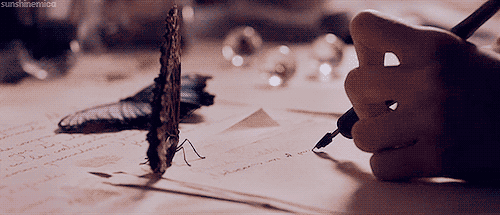
#creative writing#writing#writblr#writers block#writing advice#writers on tumblr#writing community#writing tips#writeblr#words#writinghelp#bookswriting#books and reading#books & libraries#comic books#books#bookstagram#reading#screewriting
6K notes
·
View notes
Text
this is a very cynical bomb that i’m about to drop with absolutely no context but they really did just fetishize rio to gain viewership without actually ever giving a shit about his value as a character, and i’ve gotten myself into a bit of a spiral stewing about it.
tw: my opinions again
like i didn’t want to think about my favorite show so negatively before it ended so i tried to steer clear of any posts that discussed it for the sake of my own enjoyment but after how short the finale season fell from my expectations, it’s hard not to be pissed off. because ever since they had beth shoot rio in season two i’ve been waiting for them to reconcile such a gruesome choice by developing the characters further, their relationships, their knowledge of themselves, but it just didn’t happen. beth never took accountability for the shooting, rio never took accountability for kidnapping and pressuring her, and dean never took accountability for his infidelity or faking cancer, which were the three main points of conflict that the writers should’ve focused on resolving before ever even thinking of introducing new conflicts.
i’m not saying i wanted rio to forgive beth, or that i wanted beth to forgive dean, or that i wanted any of these resolutions to happen immediately after their conflicts took place. and sure, you could say that beth’s character compartmentalizes and that beth and rio aren’t good communicators and didn’t have a strong bond of trust to begin with so it wouldn’t be in character for them to discuss what happened, but that’s where character growth is supposed to come in! you’re supposed to write characters with these flaws so that they have a better version of themselves to work towards that is slowly developed as they encounter each conflict. they’re not meant to make them into worse people until the show is entirely unbearable to watch because all of that old resentment and tension is just rotting away beneath the rug it’s been swept under.
it’s not a creative choice to have characters directly create conflict and then never address it again while they move onto the next big thing -- it’s lazy writing, and it makes it crystal clear that they were written in solely to shock the viewers and create tension between the characters, not to cultivate growth, and that is very frustrating when you have a group of characters whose inherent morality is constantly insisted upon.
what’s especially frustrating about this is that it not only means there is a lack of depth to all the characters, but there’s a lack of value to the ones that the writers did not favor. based on the season one storyline that culminated in rio shooting dean and letting beth live -- essentially getting even with her in a way that didn’t involve killing off the protagonist, even though that would’ve been the most likely course of action based on the consequences that other disposable characters suffered (i.e. eddie) -- it’s my belief that the writers didn’t expect to keep rio on the show past season one (honestly, it kind of feels like they didn’t even expect to get another season, based on how messy the storyline felt as the seasons progressed), and therefore didn’t value rio’s character the way the audience came to by season two.
when i say the writers didn’t (and honestly, i still think they don’t -- not in the same way they value the girls, dean, stan, or even fucking boomer) value him, i mean they didn’t see him as being worth the effort of giving a character arc, a background story, personal relationships, etc. they threw in marcus at the start of season two to be like “he’s a dad! that means he has depth!” and then never really touched on it again. there was like, one other scene with marcus that i can remember, and then he, too, was sidelined until they needed to humanize rio again after he got shot. all of the other kids -- the bolands, sarah, harry, and ben -- are regularly featured because they are a driving component of the women’s motivation to survive and succeed. with rio, his kid is only used to relate him back to the women, to make him seem human for a moment, but marcus’s real value as a character lies in how he makes beth feel as she grieves rio, not how he contributes to rio’s behavior, motivation, and overall character.
and yes, i know that rio is technically a side character, that the children of the protagonists are going to have more development, but if they actually wanted to add depth to rio’s character through the facet of parenthood, they would’ve shown more than one interaction with him after he spent supposed months away from him without a word. that kid would’ve been traumatized by that, and seeing rio’s reaction to his kid mourning his disappearance would’ve provided a much more real and interesting angle than them all smiling and happy, like we’ve seen in every other scene with him and marcus. it would’ve showed that the writers care about rio’s pain, about how his absence affected those he loves, but to be blunt, they don’t. they showed beth grieving him when she shot him, but we didn’t see him recovering from that traumatic event. they didn’t even care enough about him to give him fake scars, for christ’s sake.
everything that happened to rio throughout the show was either done to further the other women’s development or appease the viewers, and they made zero effort to hide that. they walked his characterization backwards so many times (him threatening beth’s family when it had been insinuated thus far that that was the only line he wouldn’t cross; him touching her and making suggestive advances on her in exchange for bail money when she was clearly uncomfortable; him returning all of her stuff and happily accepting her as his superior when there was no development in their relationship to suggest he’d forgiven her or would be receptive to her having power over him) and almost every single instance of them using him to promote the show exploited his outward appearance and the fact that so many viewers have fetishized him as this “exotic” bad boy without any regard for how minimizing and insulting that marketing tactic is.
looking through their instagram, i saw no other instance of an actor’s picture being posted next to a bunch of thirsty tweets or captioned as being “another reason to watch good girls.” it’s fetishization disguised as playful, well-intentioned endorsement, but if they were really referring to rio’s character rather than his appearance as a reason to watch the show, we wouldn’t be seeing his face on nearly every episode promo and highlight with him only occupying about five minutes of screen time every 50-minute episode.
there’s not really a neat bow-tie conclusion to this, but what i’m getting at is that the writers wanted it both ways. they wanted the viewership and fan engagement that manny’s character garnered, but they didn’t value him enough to give him the screen time and characterization that he deserved. this resulted in all of the revelations that were made about his character -- his son, rhea, his dynamic with turner, his backstory, his hobby, his grandma, nick -- feeling pretty underwhelming because they were never touched on again. they were there because they had to give us something, but they weren’t important enough to the writers to be expanded upon, to be used for personal growth or connecting with the other characters. i think that’s why it felt like such a hollow victory -- we got exactly what we wanted in theory, but there the foundation of it all was too weak for it to feel truly meaningful.
we wanted rio to be acknowledged and written as a permanent fixture on the show, but instead the rest of the characters were hell-bent on getting rid of him and his primary aspect of redemption was what he meant to beth, not what he meant to the show. even in the finale when she finally came to the realization that she won’t ever be able to give up crime, rio’s role in contributing to her self-actualization was passed over by a character who has been in seven episodes, and i think that really spoke for itself the loudest in terms of how much the writers truly valued him.
#dropping this here and promptly turning my phone off#good girls discussion#good girls speculation#good girls cancellation#good girls finale#good girls spoilers#good girls season 4#good girls season 3#good girls season 2#good girls season 1#good girls brio#brio good girls#good girls nbc#nbc good girls#good girls rio#rio good girls#beth x rio#rio x beth#beth and rio#rio and beth#gg brio#brio gg#good girls analysis#gg analysis#gg season 3#gg season 4#gg season 1#gg season 2#gg fandom#good girls fandom
156 notes
·
View notes
Note
I don’t get how Endeavour can be a fault of hero society when his actions were his own. Even if he had some Tragic Backstory it wouldn’t be the same as the villains because he abused his wife and kids while claiming to be a hero.
Re: the Shouto portions of this post.
But would he have abused his wife and kids if it weren’t for the ranking system?
If I sound flippant, I don’t mean to; it’s a serious question.
(Hit the jump for some breakdown. It's not a super long one, but if you're just very tired of or sensitive to Endeavor discourse, I want to make it easy to give this one a pass.)
The Hero System is a toxic one, one that gradually, slowly corrupts everyone who lives in it, heroes, villains, and civilians alike. It’s a system that encourages its caped law enforcement to prioritize quick and decisive “incident resolutions” over the more difficult, more time-consuming, more subjective, and less certain work of de-escalation and prevention. The “public approval rating” is a glorified popularity contest and we don’t even know what exactly counts as a “contribution to society.” And from this mysterious algorithm is derived one’s Hero Ranking, by which one is paid more, given more funding, rewarded with greater prestige.
It’s a system that defines its members by their opposition to Villains, one that dehumanizes anyone on the wrong side of it, encouraging heroes to deal with them quickly and forcefully. It doesn’t reward defusing a situation; it rewards showboating for the crowd. Even heroes who have nothing but good intentions, even heroes who don’t care about their popularity, if they want to be successful, have to learn how to play that game: Endeavor may not make nice for the crowd, but his agency damn well still signs off on the merch, same as All Might’s does.
Why, exactly, is it so important for Enji that he be Number 1? Is it something traumatic from his youth? A learned value? Toxic masculinity turned up to 11? We don’t know, and honestly, I don’t think we need to know. What I care about in this context is not the root cause of his competitive personality, but rather, the ways in which that competitiveness was exacerbated by the Hero System in ways it might not have been if that system did not exist in its current form.
In a toxic environment, some people are going to feel the effects of that poison harder than others based on pre-existing traits and conditions. Obviously, it’s important to prioritize the people who take it the worst, but it’s also important to get the damn toxins out, you know?
I have to imagine Enji would always have been a competitive sod with or without the ranking system. I don’t think it’s about the money or the prestige for him; I really do think whatever his damage is, it’s personal to him. But if it weren’t for that big shiny number to chase, would he have gotten as bad as he did? If there was no rank to hold, no prize to claim, no headline to shout his worth to the world—if he just had to do his job like everyone else, and every metric he had to compare himself to others existed solely in his own mind—if all of that: Would he still have wanted it so badly as to seek out a practical-at-best marriage with a woman he didn’t love? So badly he would traumatize his children in ways they will be dealing with for the rest of their lives?
His actions are his own, and that needs to be reckoned with, sure. But just as there are mitigating factors in how the villains wound up where they did, and we can’t expect HeroAca!Japan to have materially improved if no one is addressing those factors before the series ends, there are mitigating factors in how heroes wound up where they did, too.
Endeavor’s society can hold Endeavor responsible for his actions and also ask, “Is there a way that this could have been avoided? Is there something we can do that will reduce the chance that it will happen again?”
To gloss over the systemic factors that led someone to abuse is to write off the pain of future victims that might yet be avoided. And why? Because we want so badly to pin all the wrongs of the world on Evil Abusers and not have to follow a path that might potentially lead us to a mirror? Because we can’t stand the idea that the Evil Abusers might be spared one iota of the punishment we think they deserve?
Society owes its victims—past, present, and future—better than that. It owes everyone better than that.
Okay, some people say, but why is any of this the kids’ responsibility? Why is it their job to make all this better? Why should a victim like Shouto have to clean up his abuser’s mess? And you know, that’s a totally fair question! Neither Shouto nor his classful of fellow sixteen-year-old students should have to be bearing the weight of these questions for their entire society; that’s hardly a fair thing to ask of anyone, no matter how old they are!
The thing is, they’re training to be heroes, to join this corrupt system. That means that when they’re confronted with that system’s failures, they can’t just say, “It’s not my fault; I didn’t make things this way.” They may not have made things the way things are, but if they stick their heads in the sand and pretend they’re not wearing the uniforms they chose to don, they do, in fact, become a part of the problem.
Furthermore, and zooming back out to remind everyone that Boku no Hero Academia is fiction, there’s also the matter of what is being required of the students by the narrative itself. In that regard, the series has insisted on holding up Class 1-A as the shining example of what heroes should be, what Hero Society should be; all the implications are that they’re at the forefront of changing the corrupt system they live in. Maybe a different series would have spread that responsibility out more, but the one they’re in has not. If they don’t undertake this, no one will.
It may not be fair, but it’s the story they’ve got, and as the main characters, I’m afraid it is their narrative responsibility to live up to it.
tldr; Endeavor has to fill three roles:
Todoroki Enji, a person who has hurt other people and will have to suffer the consequences of being treated accordingly by those victims.
Number 2 Hero Endeavor, a representative example of the kind of hero that is created and celebrated by the system he exists within; his flaws must be approached in light of the system that exacerbated them.
Boku no Hero Academia's Endeavor, a fictional character created to facilitate the telling of the story Horikoshi Kouhei wants to tell.
The same goes for any sufficiently realized character in a story; they must, simultaneously, be individual people with individual relationships, while also being reflective of the world they live in, while also serving whatever function it is they need to serve to get across the messages the author is trying to communicate. You can look at the characters as only one of any of those things—indeed, focusing on the first one and to a lesser degree the second one is where fanfiction sets up shop—but to get the full picture for things like predicting or analyzing the canon, you kind of need to be looking at all three.
Thanks for the ask, anon, and hope that cleared up my meaning!
#bnha#hero society#todoroki enji#bnha endeavor#class talk#sometimes characters have responsibilities to the story that it might not be fair to ask of real people#especially young people#that's just....fiction
40 notes
·
View notes
Note
If Immor had a theme song, what would it be?
!! thank you for the ask!! yk there are a lot of strong contenders in his playlist so I'm gonna list them all out and the pros and cons of each before I decide, for Funzies
1. Rocket Man (I Think It's Going To Be A Long, Long Time), by Elton John:
First of all, it's Elton John, and he is a middle-aged father. In my experience, middle-aged fathers love Elton John. It's a requirement for the job. Immor would love Elton John so this is points in favor for this song. But this one I think is so well fitting because of the metaphor of being on Mars, away from your family, just kind of fits very well for him particularly in the context of our dnd campaign, and the whole song just feels a little tired, a little ready to just go home, and it reminds me of how this man has been through so much and wants to live a quiet life at this point but God Won't Let Him Rest. and the whole "I'm not the man they think I am at home" where he's largely regarded as a hero for actions he took that not only directly led to the most traumatic experience of his life but that he took largely for reasons he regrets, where I think he'd accept the title of hero if he'd taken those actions for the right reasons but at the time he wasn't thinking about saving lives as much as. other things. which I won't type out (and honestly I'm being vague in general here) both bc that would need a trigger warning and because it's a backstory spoiler and I know you specifically would rather learn that naturally over the course of the campaign. but yeah.
2. The Run and Go, by Twenty One Pilots
Now while Twenty One Pilots is generally not really the style of music I think Immor would enjoy, unfortunately for him, it's the music I enjoy, so I was going to find at least one song fitting for him out of their entire discography that I listen to too much. This one's really fitting because I think it outlines super well Immor's need to absolutely not burden anyone with his problems, yet the acknowledgment that he can't carry it all alone with the chorus. and then the fact that this one is written in a 2/2 march time signature also really helps. I think marches and waltzes fit Immor really well from a music theory perspective, with the first being stately and organized in nature and the second lending itself well to slow, classy pieces.
3. Ship in a Bottle, by fin
This one I think is really fitting because once again it kind of addresses the walls Immor puts up and the way his own independence backfires on him pretty strongly at times. Something else about the theme of the threat of drowning alone at sea really fits this too, since that's absolutely one of Immor's greater fears, where both the metaphorical and literal interpretations of the song address his fears and, honestly, a response to trauma. But then also this one really is good bc the opening to the song is sort of about rebuilding yourself and putting on a neatly-presented facade for the people around you, and Immor has worked very hard to not only change fundamentally the person he used to be before the traumatic experiences of war, but also had worked to hide what he cannot or has not been able to change, such as his physical scars or his ptsd. And then denial absolutely factors into that as well, where he not only refuses to seek help but refuses to even admit he needs it or admit how his trauma has affected him which is also reflected in the song. unfortunately this one also suffers from Immor wouldn't like the music syndrome though, so that's a point against it
4. This Is Gospel, Panic! At The Disco
now while Twenty One Pilots was an ill-fitting musical style, P!ATD is even worse, but! but. the lyrics make up for it. first of all the lyrics have a slightly anti-theist vibe to them which I think is fitting for Immor, given that he's an atheist at this point less because he has little proof that the gods exist but moreso because he doesn't believe they deserve worship. then, once again we have the theme of being "afraid of falling apart," which I don't think I have to explain again, you get it at this point. unlike ship in a bottle, this song has a little bit more of a determined fighting spirit to it I think, because while ship in a bottle feels determined it's more like breaking-point, barely keeping it together determined. Immor's good at keeping it together. he's well-practiced at it. I think this is gospel does a good job of keeping the same themes while being a bit more in-character for Immor's day to day temperament. plus one of the lyrics is "[this is gospel for] insufferable bastards and the man do be a bastard that is sometimes even insufferable
5. Work Song, Hozier
Hozier, like Elton John, I think would fit Immor's tastes very well, especially this one with the particularly slow pace and steady, heavy beat. I like that this one's still got a determined vibe to it with the whole "no grave can hold my body down" but also has themes of love in it because God his family is so important to him. "I'll crawl home to her" I am going feral. I am weeping. he wants to just be home and live a domestic life with his wife and children so badly. This song even alludes to Regaya's backstory with "nothing in her room but an empty crib" and I love that in the song Hozier sings about his baby finding him during a dark time in his life because that's absolutely what happened to Immor.
and now that I've written all that out in a manner probably incomprehensible to most I am even more torn about which song would be his "theme" song. it's really hard to capture a character's entire personality in a single song I didn't write myself, yk? I think if normal poems were included here it would be easier to answer, just because of the poem "Invictus" by William Ernest Henley that fits Immor so well I literally put it at the top of his backstory. because I am extra, here it is:
Out of the night that covers me,
Black as the pit from pole to pole,
I thank whatever gods may be
For my unconquerable soul.
In the fell clutch of circumstance
I have not winced nor cried aloud.
Under the bludgeonings of chance
My head is bloody, but unbowed.
Beyond this place of wrath and tears
Looms but the Horror of the shade,
And yet the menace of the years
Finds and shall find me unafraid.
It matters not how strait the gate,
How charged with punishments the scroll,
I am the master of my fate,
I am the captain of my soul.
God that poem goes so hard and is so good for Immor. but I don't think I can pick a single song for him. none of the music he would like encapsulates his character quite as fully as I'd like and the songs that capture that pretty well lyrically or thematically are songs he wouldn't like. still I hope this was a satisfactory answer and I had a hell of a lot of fun answering this question. reminds me of AP Lit, practicing my poetry analysis skills and comparing literary themes. the good old days
#asks#oc: immor#misfit crew#if anyone wants to ask this question for my other characters as well I would be equally happy to ramble about them for hours too 👀
3 notes
·
View notes
Note
So I honestly thought of this ask from the Dilruba ask you got that spoke about Safiye’s idolization of Hürrem and Nurbanu. It makes me think, I felt like in observing Safiye’s character, she exhibited a phenomenon in which you’ve spoke of before, in which she reached a point of her life where she completely internalized and became the toxicity in her enviornment. I feel like she put Hürrem and Nurbanu on such a pedestal (especially with Nurbanu having treated her so terribly) is because she adapted a Social darwanist mindset of sorts which caused her to firmly believe that those who were/are “strong/worthy” were those who succeeded within the system by any means necessary, even if that meant killing and harming even those closest to them. It felt to me almost as if she came to “understand” Nurbanu’s stance towards her or even sympathized with it albeit in a strange, traumatized way? Or when she wanted to pass down her ring to Kösem after she suceeded in killing Iskender, it was almost like she wanted to congratulate Kösem on being able to kill her son. It’s interesting, like her entire moral compass was completely warped having been in the harem for so long and in unlike any way I can recall seeing on other sultanas in either franchise. I don’t remember Mahi/Hürrem coming to idolize Hafsa later in their lives but this could also be because the SOW time period was still relatively fresh in their time and Hafsa may not have wielded or exhibited as much power as Nurbanu may have as a valide sultan. What do you think?
Yes, Safiye as a character is the embodiment of these destrustive philosophies to the extreme. The toxic system leaves no one untouched and she is indeed one of the characters in the SOW and in the franchise overall that is the most affected by it.
Unlike Hürrem and Nurbanu, where we get a solid exploration of what exactly made them this way, with Safiye we have the philosophy set at the very start, her introduction sets many things clear. We know that she loves power. We know that she wants to keep that power until the end of time. Her role as an antagonist is revealed immediately in her unwillingness to give up her power. One may find her a little less multi-faceted, precisely because her motivations were more vague than the rest- we don't get anything outright with her, we don't get much insight. We're left to figure things out by ourselves. That doesn't make her a cardboard cut out however, given that we have very vague reasoning, but with enough context to see what's behind it. I find her "backstory" counterpart very interesting in that she could only be used to drive a contrast between MC E139 Safiye and MCK Safiye, be presented as the former shadow of Safiye's self, what she has previously been. With only a single scene we technically have her foundation, but what is retroactively set-up (her worship of Hürrem aside) is completely turned on its head. MC E139 Safiye is perceptive that one day you have to step out of power, but that's the primary dilemma of MCK Safiye, the very thing she refuses to do. It's hinted that she has had many, too many years of power in the harem and it's not only something she has become used to, it's much more than that: it's as if she's had this power her whole life. The prospect of her losing it has become truly unthinkable, out of reach. She has gained an self-image of greatness that would always "sustain" the castle and preserve its life force. She's accustomed to endless, limitless power. She has set her own network of people. She loves every aspect of this power: both the simple and the complex stuff, from her long morning routine to her orchestrating things from the inside. Her power as a concept alone is her whole being and I don't think she ever separated herself from her royal demeanor. She is always power and majesty and splendor everywhere, from her dresses, to her mannerisms, to her constant addressing of herself as "we", taken from European courts.
I agree that she values power as something for herself and something that is hers by right, not for the advantages or disadvantages it may bring. Safiye doesn't care about that: as long as she's there and in power, it would all be fine, it would be enough. Safiye has her own distorted understanding of applying power: she speaks constantly about the dynasty and the country (just like many sultanas), but she leaves them aside completely when she's threatened. And she doesn't view what she does as morally right, she's always ready to play dirty in order to maintain her own accomplishments and to outplay everyone else. She actually resorts to dirtier and dirtier tricks the more she loses her power. I did mention when paralleling and contrasting her with Kösem in another ask of yours that Safiye, unlike Kösem, doesn't focus her efforts on reaching out to the people, she is a lone wolf when it comes to power and she is projecting indisputable superiority on everyone she's in front of. The closest relationship she has is with Bülbül and even that is merely an addition to Safiye and the result of him being the person always next to her and fills all her whims much more than it is all genuine affection. The Darwinian philosophy is what she lives by; and the notion that she gave the ring to Kösem because of her starting to respect another person's own power except for her own, admitting that someone has outplayed her, doing it only because someone has outplayed her, is really important. Her arc was about finally accepting defeat after deluding herself for so long that no one could truly eclipse her, but then again, has she gotten completely over her toxic environment? Hardly. Because once again, by giving the ring, she symbolically continues the SOW cycle that has, in the show, many toxic aspects especially when it comes to power. Safiye could respect people only when they keep up for longer than she anticipates, have been tied up to her in a more "unconventional" way and have a (previously and contemporarily) good position on the hierarchy. She did accept Kösem as a rival at the end of the day, in part probably because she started off as someone loyal to Safiye and evolved way past that, but didn't accept Handan, because she couldn't face it that someone like her, someone she perceived as weaker, can now rule over her. I saw Safiye as someone finding disobedience from a person previously loyal to her more challanging than a permanent, irreparable change of the hierarchy she is strongly dissatisfied with. Her elitism is so strong that she doesn't go past it even when there is a change in position. She doesn't get over that biased, stereotypical thinking.
She worships this Darwinist philosophy in Hürrem, that she's the strongest survivor, that she has prevailed over her opponents, without having the chance to know the bigger picture and has heard only the banter of someone who is still biased to her after all (Mihrimah). She shares this philosophy with S02B post-E59 and S04 Hürrem in even scarier extremes and that's what she has set as an example for herself. It's true that she takes this mindset from this cult to Hürrem, too. This very disrupting cult of hers. But then again, I never saw her sympathizing with Nurbanu, per say? She's perfectly able to acknowledge Nurbanu's cruelty and correct me if I'm wrong, but the only praise I recall for her is her being the most beautiful (but the cruelest) sultana she's ever known? Which in no way indicates sympathy. But I wouldn't brush off at all Safiye viewing fer experiences with Nurbanu as the twist of fate, in which she has prevailed after all, but could acknowledge the ones before her. (but not after her, Kösem aside.) Safiye isn't that kind of person that would show in any way that she has experienced trauma, but she could've brushed said trauma even deeper within than other characters, to the point that her direction even would never ever indirectly hint at it, keeping her usual regality in check.
[Hürrem did say she set Valide as her own example in her last words to her in E61, but I get how it could be missed when she also lamented their previous, not so good experiences and told her about Nigar and Ibrahim, which put an end to Valide's life. Mahidevran, on the other hand, never mentioned Valide post-S03 outside of saying that they would bury Fatma in Ayşe Hafsa's mosque (was it?). They both mourned her death, but interestingly enough, both of them have "violated" her memory in some way by wanting her chambers. Mahidevran wanted the chambers to set her own model in the castle during her harem ruling period, while Hürrem wanted it to show she could one-up everyone, for them to respect her the way she thought she deserved. There truly wasn't this worship to such extent as in MCK, also because it presented the beginning of the SOW rather than the peak of it. There wasn't much to blindly praise there, hence the effect wouldn't be as strong.]
#magnificent century#muhteşem yüzyıl#muhtesem yuzyil#magnificent century: kösem#muhteşem yüzyıl kösem#muhtesem yuzyil kosem#safiye sultan#ask#stuffandthangs
30 notes
·
View notes
Text
Us Vs Them: What that means for Sakuya
Hey, here’s that other post I was talking about, featuring more of my ramblings strung together from bits of discord chats and half formed thoughts. It goes… Pretty off the rails at one point. I’m sorry about that!
To start with, thanks to chapter 104 confirming something for me, I had a bit of a breakthrough. Under the read more, because I can’t shut up <3
Misono... Isn't just a narrative foil to Sakuya.
The Aliceins are meant to mirror Team M entirely, and the same sort of mindset can be found in both groups
"We are kind to our own, but cruel to anyone who is Other"
For Misono and Sakuya both, breaking away is integral to stopping the cycle of pain and revenge both groups have found themselves caught up in. And for this reason, I think that an eventual team up between the two is inevitable. (final showdown trio, sakumahimiso, lET'S GO)
Also this bit is for @bluemoonfantasiesiii cuz they’re a color slut lol
Mahiru, Misono, and Sakuya are all assigned secondary colors as their major color motif. Orange, purple, and green.
Now let’s look at our “antagonists”
Tsubaki: Red
Mikuni: Yellow
Hugh: Blue
All primary. Does this mean anything? Maybe not. Is it making me nervous? Ohhh, hell yeah it is.
Have an accurate example of how I look anytime I discuss Servamp
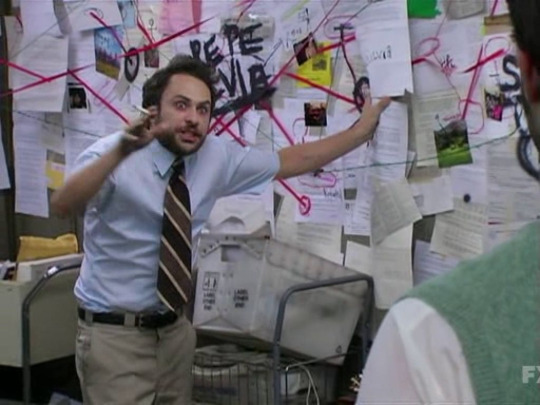
But if I throw enough shit at the wall, eventually I’ll make Jesus, so we’ll have to wait and see :P
--To go back to what I’d like to see moving forward for a minute, this time for Sakuya, I’d absolutely love for Lily to, like, actually Talk with Sakuya for five minutes and get smacked in the face with the reality that he is super duper traumatized and desperately in need of a loving, supportive home full of people who actually understand how to address his issues. Because Tsubaki loves his subclass... But he doesn't know how to help them, which is why I sometimes refer to his group as a halfway home.
Basically Lily goes yoink! and Sakuya's just ????? Did I just get adopted?
See also: very stupid and farfetched desire for Mikuni to subconsciously treat him somewhat similarly to how he treats Misono, because he sees some of his little brother in him
Another thing is for Lily to help him deal with his, frankly, as much as I love sakumahi, unhealthy level of attachment to Mahiru. And sometimes I like to play with that. Most of the time, in fact, cuz I thrive on that fucked up shit. But in the context of canon, what I want for Sakuya is to be able to have healthy, normal relationships with people, and with Mahiru as well. He's practically addicted to the way Mahiru makes him feel, and that's... not good.
… I think Lily would pity him. He recognizes Sakuya latching on to the first person that made him feel like life was worth living, but he knows that he needs to learn to let go... Or else he'll end up with nothing.
And do I want Mahiru to get really fucking angry about Tsubaki airing his best friend's trauma to him without his permission and slug him in his stupid pretty face? Yes. Yes I do.
As far as that goes, though, I kind of want to interpret that as Tsubaki being somewhat self aware that he is not equipped to handle Sakuya's trauma, and asking Mahiru without actually saying that's what he's doing to try and help Sakuya because he would have seen how much brighter and happier this one little slice of normalcy made his grumpiest and most rebellious subclass. But Tsubaki is also, like, hella fucked up, so he flubbed it bad lmao
--Could also just be early story pitfalls of Strike trying to follow a very shounen, formulaic way of divulging a character's backstory to the reader via trauma dumping and then later realizing "wait this is stupid, I need to be better about this"
Because after Lust Arc, unless Mahiru is involved in the resolution, he never learns about the other character's traumas. He doesn't know about Ophelia. He doesn't know about Shamrock and Shuuhei's history. He doesn't know about the Chuuni Trio's friendship as kids, and how all that evolved. He does know about Kuro. He does know about Tsurugi. He actually... Doesn't know about the full depth of Touma's pain. Touma only shared that with him out of spite. But he knows the most important parts, and is able to put together everything else on his own.
Speaking of trauma dumping, I would really love to see those two instances of it, of Tsubaki divulging Sakuya’s past without his consent, and then later Mikado doing the same damn thing to Misono (hey look, more character parallels!) to come back to bite Mahi, no pun intended. Like the stress of it all, and the weight he's carrying, the knowing that he has been given access to things that aren't his right to have, especially after he went out of his way to be conscientious of Kuro's needs by asking to be let in, rather than brute forcing it the way Inner Sloth wanted. Mahiru is such a gentle person, and he'd hate that he has, whether by his own will or not, trampled on the privacy of people he loves.
Because regardless of the kind of love someone might personally think he feels for them, he does love both Sakuya and Misono. Loves them dearly.
And maybe that's why Misono warmed to him so quickly, alongside Lily. That faint sense of acceptance, of caring, of a heart too big for his chest.
The world has fangs, but Mahiru is willing to bleed.
33 notes
·
View notes
Text
Ninth House, Leigh Bardugo
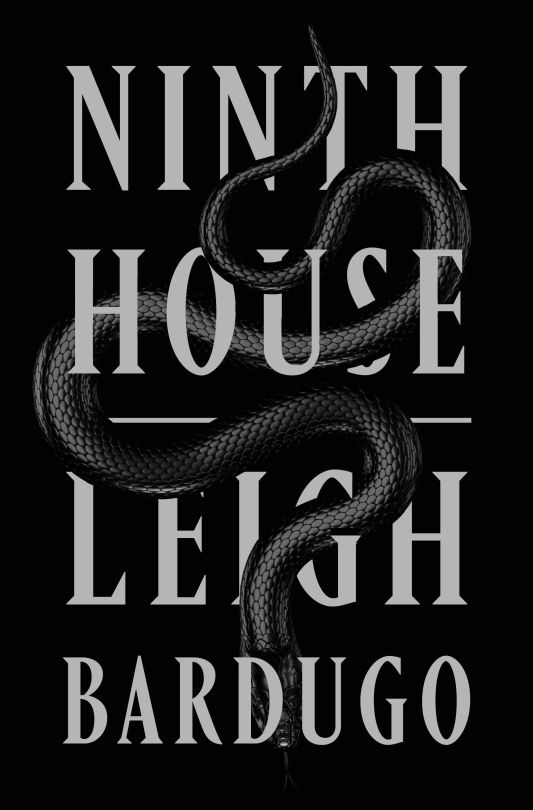
Rating: Mixed Review Genre: Fantasy, Mystery, Dark Academia Representation: -Bi/pan protagonist -Jewish protagonist -Latina mixed race protagonist Trigger warnings: Sexual assault (in scene), rape (in scene), CSA (in scene), graphic violence, murder, drug use, drug abuse, drugging of another person, overdose, domestic abuse, medical abuse, violence by dogs Note: Not YA
Why is it that every time I read Leigh Bardugo, I love the book with a passion...except for one thing that makes me want to tear my hair out?
Here’s what seriously impressed me about Ninth House, Bardugo’s entry into New Adult. The pacing was phenomenal. The measured, perfectly timed revelations of information had me finding excuses to listen to the audiobook - taking extra neighborhood walks, doing extra loads of laundry - because I was so hooked. Then, there’s the worldbuilding. Bardugo managed to walk a delicate line, successfully suspending disbelief while still asserting that eight Yale secret societies do secret magic rituals to the benefit of the oligarchical capitalist machine (we all kind of suspected this was the case, right?). But the best part of the book, the part that had me recommending Ninth House in more than one group chat, was, of all things, the point-of-view jumps.
Rarely are point-of-view switches the star of the show, but I was so excited to see a genuinely original, intrinsic-to-the-heart-of-the-whole-novel use of that technical tool. The point of view jumps crank the volume up on the theme of the whole book. We start with the main character, Galaxy “Alex” Stern; she is the point-of-view character for the present semester during which the principal action of the novel takes place. Her upperclassman and mentor Daniel Arlington (or “Darlington”) is the point-of-view character for the semester before - all because something happened to Darlington. Alex is telling people he’s doing a “semester in Spain,” and all the reader knows is that her explanation isn’t strictly true. The point-of-view jumps being so strict (there is never an Alex perspective chapter during last semester, and never a Darlington perspective in the present) serves to separate the two characters from each other with a really incredible emotional effectiveness. The heart of the novel, for me as a reader, was yearning for these two to be reunited - and all because Bardugo holds the two character points-of-view separate across an unbreachable temporal divide. It’s a powerfully effective technique.
But let’s backtrack. Alex is a 20-year-old high school dropout from the west coast. As the story progresses, we learn that Alex can see ghosts, which is why, despite never finishing high school or getting her GED - or even applying - Alex is a freshman at Yale - contingent on her joining the secret society called “Lethe House” as apprentice (“Dante”) to the current leader of the society, Darlington (the “Virgil”). Lethe House is the governing body of the eight Yale secret societies that practice the magic that keeps the elite in power. These secret societies make books sell, make T.V. anchors charming and compelling, and open portals to other parts of the world - when they aren’t throwing over the top Halloween parties with magic designed to alter one’s perception of reality.
Darlington, by contrast to Alex, seems to belong at Yale. He’s from an old family, and he’s preppy and well-read. Most of all, he loves Lethe House and its history of keeping the secret societies from harming people in their pursuit of magic and power. That is, until he disappears just in time for Alex, only half-trained, to investigate the murder of a girl on campus.
The first three quarters of the novel are fantastic for the reasons stated above. Bardugo’s approach to mystery writing is effective. We have half a dozen suspects, most of whom, as elite ivy league magicians, are at least guilty of some misdeed. Having all your red herrings end up somewhat culpable anyway is a good way to keep your mystery difficult to solve until the end. We were off to a good start.
Unfortunately, in the end, Bardugo made the all-too-common choice to value “surprise” over the most compelling, satisfying solution. So while the reader doesn’t see the ending coming, that is at the steep cost of the ending not being justified by the rest of the book. Bardugo even has to invent new rules of magic off the cuff to justify the ending. When the rest of the book so painstakingly developed the rules of magic in a way that made sense and never felt overly expository, undoing all that effort feels like a monumental waste. And for what did Bardugo undermine all her hard work? A mystery that the reader won’t have all the clues to solve? It’s really okay - in fact, good - if the reader can puzzle out your story. It means your story has symmetry, internal logic, or perhaps, some sort of message.
This is what had me tearing my hair out. I know exactly how I would have written the ending of Ninth House to be the perfect conclusion to a stunning book. I know exactly what the message should have been. Is it somewhat ridiculous to say that Bardugo misinterpreted the message of her own book? Perhaps. But given the out-of-left-field-ending, the theme of the book ends up being a rather cheaply bought “No matter how traumatized you are, you can be a girlboss” instead of the message that the very structure of the novel itself was pointing to since page one: one of companionship, trust, and restoration (frankly, a better message for a novel with a main character who suffers so much loss and trauma. But, sure, “girl power” is a theme...I guess...)
Here’s what I mean by the structure of the novel itself pointing to a different theme. (Spoiler warning for the rest of this paragraph). Because the point-of-view switches in the first two thirds of the novel were used by Bardugo like two magnets being held apart, the only way to create a feeling of resolution was, so to speak, putting the magnets back together: getting Darlington back into the “present.” The degree of disconnect between reader expectations and the reality of the book is comparable to picking up a romance novel only to have the two leads decide to just be friends at the end. Bardugo set expectations - akin to genre expectations - but unfortunately Bardugo kneecapped her first book in the service of the sequel.
And then there’s the trauma. Alex’s backstory wouldn’t be the same without some level of trauma; it’s an important part of her character arc. Even the explicit presence of sexual assault on the page was justified in the case of Alex’s backstory - and I think that is rarely true. But when it came to a side character’s explicit in-scene rape, which was used as a clue in the broader murder mystery rather than treated as a crime in its own right, that tipped me over into feeling the trauma in Ninth House was more excessive than necessary for character development. The resolution to that side character’s rape is oddly cartoonish - like an over-the-top prank rather than justice - and again, the only reason the rape happens to the character is to give Alex more information she needs to solve the plot. Maybe that wouldn’t bother some readers, but for me, a book has to bend over backwards to justify showing me a character being raped. Bardugo does well earlier in the book when depicting Alex’s assault; the assault is the explanation for why Alex doesn’t view magic with the same childish excitement as the rest of Yale, and it’s part of what holds her apart from the entitled secret societies. It needed to be in the book. Everything else was gratuitous.
That said, there’s one thing still to address in this roller coaster of a review, and that is: wait, is this a queer book? I had gone into it assuming that it would be, mostly because all my queer friends were reading it. And the answer is….kind of? Knowing Bardugo’s history with putting queer characters in her books, I’m going to assume she wasn’t baiting when she had Alex claim to have loved a girl in her backstory. Which, in the context of the rest of the novel, would make Alex bi or pan. As a book that a lot of queer fans of Bardugo’s YA have read, or will read, it feels appropriate to review it here.
This was a mixed review from start to finish, but to finish up: if you are thinking about reading Ninth House, go for it! There is so much to like about this book. Take to heart that if you read and liked Bardugo’s handling of sexual assault in her YA titles, you should be prepared to be surprised by Ninth House. It is not the same. I would not have called her handling of sexual assault in Six of Crows, for instance, restrained - but compared to Ninth House, it absolutely is. Despite my strongly worded feelings about the ending, Bardugo left room to redeem herself in the sequel (which, if you ask me, is why the ending was so bad in the first place...). I for one will definitely be reading the sequel the second it comes out.
#leigh bardugo#ninth house#fantasy#mystery#dark academia#not ya#mixed review#bi#reviews only#protagonist of color#jewish protagonist
33 notes
·
View notes
Text
“Clarice” Liveblog: Episode 7
disclaimer: there’s going to be discussion of a lot of little details I disliked in this one, but as a whole, I liked it a lot better!
honestly? Clarice’s coworkers have every reason to question if she’s “okay” given what we’ve seen so far on this show.
and yeah, coming back from leave a week after being repeatedly tortured does “seem soon”.
AG Martin is using Clarice just as badly as Crawford ever did.
why does Krendler look so sharp? tailored waistcoat, crisp shirt...his costumes would look more in-character for Hannibal than Paul Krendler. I don’t get it.
not sure I like the “my people mined coal, so we know when we’re okay to work” flex, but...whatever.
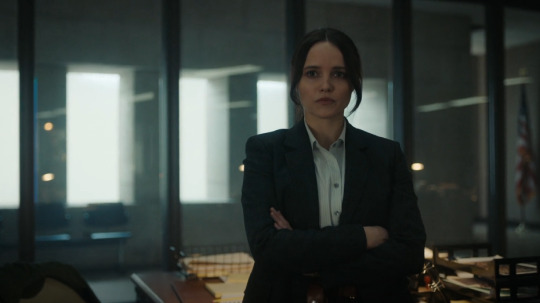
she makes some truly uninspired costume and hair choices look great
“who am I, James Bond?” are you an FBI agent or aren’t you, Krendler?
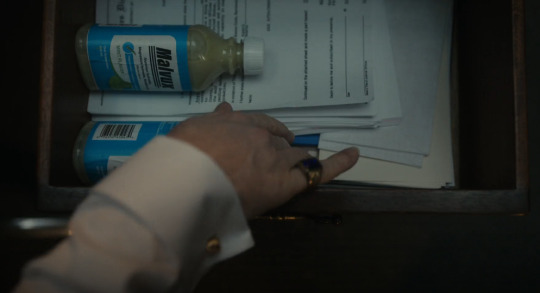
BIG Jack Crawford and his Pepto Bismol vibes, but dammit, Krendler should NOT be like Crawford!
now Ardelia’s back to collaborating with Clarice on a case like it’s no big deal??? way to make her look like a hypocrite. again.
idk, I still think Ardelia could have an FBI subplot AND be part of Clarice’s life without constantly working with Clarice within an FBI context (their careers don’t really intersect in the books). those things aren’t mutually exclusive.
“he died instantly” um, is Clarice a medical examiner now? I know she’s got a forensics background, but she’s just now seeing the body.
“Cody didn’t feel any pain” how does Clarice know that and why is confident enough to say it to the kid’s mother?!
also, are victim’s family members usually allowed right into the crime scene like that? paging @special-agent-pendragon!
“let’s talk when we can” Clarice, honey...you literally live with Ardelia, lmao.
the crooked lawyer’s office reminds me a LOT of Chilton’s office in Silence.
Paul Krendler: Good Guy and Faithful Husband...don’t know him!
and again...this is a waste of time on Clarice’s show.
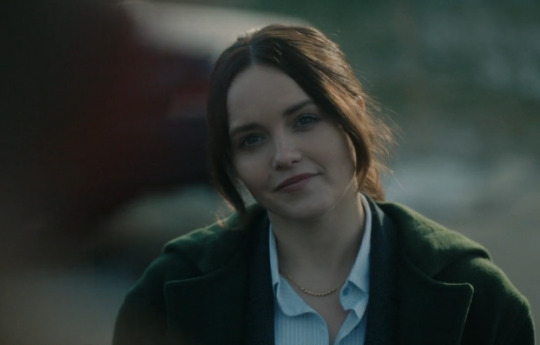
she’s so dang cute!
hey, a reference to Ardelia’s grandma!
Clarice and Ardelia working on a case together at home, off the clock, is way more on brand!
also Clarice eating junk food...that’s my girl :)
I too sometimes eat Lucky Charms out of the box, haha.
omg, Ardelia’s actual grandma!!!
and: a reference to her frying pan, the one Clarice looks into after reading Hannibal’s letter!
Clarice is finally laughing and drinking and having a good time with her best friend...I’m so happy about it.
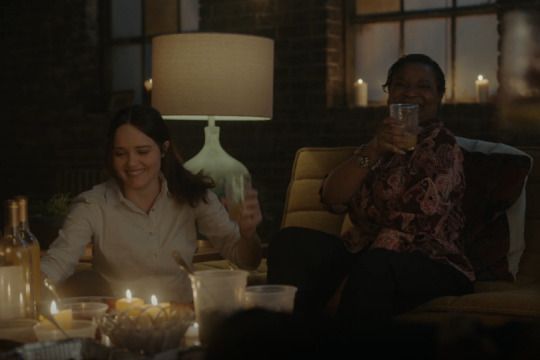
literally exactly what I wanted/this show NEEDED
“at least my father‘s still alive” oh...my god...they really made Ardelia Mapp say that to Clarice... I...don’t know what to say except that I hate it. the scene was so great otherwise, too.
to be clear, imo this is not an appropriate thing to say to your best friend, ever.
Clarice might be drunk, but her nonchalant reaction (giggling!) is all wrong too, particularly for this Clarice, who’s always been shown as deeply traumatized/haunted.
maybe I’m 100% off-base on this, but I feel like Ardelia’s backstory in this show is at odds with her career choice: why does she go into law enforcement at all? does she truly believe she can make a substantial difference? hope this is addressed at some point.
“I can’t believe you never told me that before” I know this is expository, but I can’t believe it, either, Clarice.
there’s no indication in the books that Mrs. Starling was “always angry” or that Clarice was intimidated by/scared of her outbursts. she saw her mother as a pillar of strength! I don’t like this change tbh.
“he was the law. he was important” mmm...Clarice’s father was not important, and that’s the core of the tragedy, of her anger. it’s why Hannibal calls him the “night watchman” and the reason the Starlings didn’t receive any money or support after his death. he was expendable.
to be fair, I guess maybe this is supposed to be what Clarice’s idea of him was as a child.
this scene is full of little things I don’t like, and Clarice’s father giving her the add-a-bead necklace is definitely one of them.
in the book, Hannibal guesses that Clarice is afraid her beads now look tacky (having been previously trendy in the early-to-mid-80s...so, well after her father’s death). there’s NO indication they had any sentimental value (in fact, they’re never mentioned again iirc)--and with four kids to support, how can he afford to give his eight- or ten-year-old daughter decent jewelry, anyway???
I like the IDEA and the FEELING of that scene. just not the dialogue. and the entire thing is slightly undercut (imo) by Ardelia’s earlier mean-spirited comment. idk. it was cute, but this show’s writing is its own worst enemy.
Ardelia called her “Starling”! :)
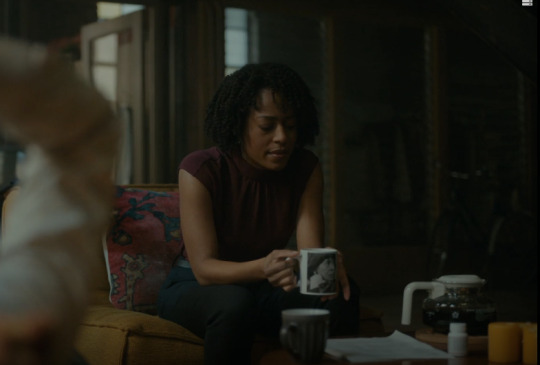
Clarice’s costume is yet again blah, while Ardelia’s is great...anything but 199x, though.
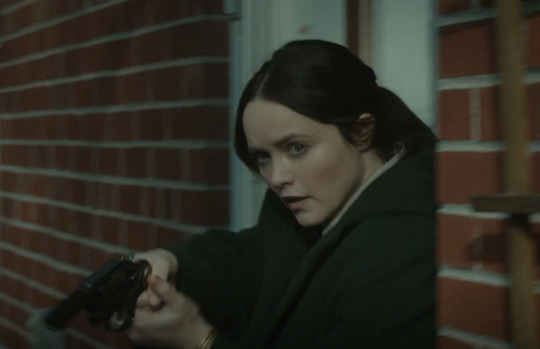
money shot!
whew...didn’t see THAT plot twist coming.
Good Guy Paul Krendler continues to be a thing for some reason.
does the Hoover building only have one hallway?
Krendler gaslighting Clarice because someone is blackmailing him doesn’t hit the same as Krendler undercutting her career because he’s a sexist jackass who wants to fuck her. sorry.
Good: Clarice laughing/smiling/joking/having fun with her friend! A (could-have-been-better) bonding scene with Ardelia. Clarice getting to work a field case and the iconic shots that come with that territory. Ardelia’s grandma! Not a single mention of the Bill case, thank God.
Bad: Some of Clarice’s snap forensic judgments...they just felt too fast and unconvincing to me. Everyone’s costumes and hair continue to underwhelm me. (Why has Paul Krendler stolen Hannibal’s wardrobe? Why can’t Clarice wear something even remotely exciting?) Ardelia’s awful “at least my father’s still alive” comment. The muddled implications about Clarice’s mother (especially in an episode about an abusive mother).
Ugly: Krendler subplot, as usual.
Overall? Better. Much better. Absolutely a case of “the whole is greater than the sum of its parts”. Despite its subject matter, this episode was a lot more pleasant to watch than the previous two. Clarice had a limited amount of character development beyond “doe-eyed and traumatized,” she actually got to laugh, enjoy life, eat junk food (!) and solve a case with a friend before it all went to hell.
I want more, though. The writing leaves a lot to be desired. There were a lot of small details of which I was critical, namely Ardelia’s insensitivity towards her best friend (unfortunately, this seems to be part of a pattern) and several minor but jarring and pointless changes to the books (mostly having to do with the Starlings). Most of the ViCAP team is still pretty one-dimensional, Krendler continues to get way too much screentime, Ardelia is hit-or-miss.
And Rebecca Breeds has to milk every moment and every line for whatever nutritional value it’s worth re: Clarice’s character. Even after seven episodes, I don’t feel as Rebecca’s Clarice has been allowed to fully emerge as the iconic character we know from the books. But I’ll keep on hoping...after all, there are at least three episodes to go!
#clarice#cbs clarice#Clarice Starling#rebecca breeds#only a week late this time heh#*a week and a half now oop#sorry for the lateness and the nitpicking but how hard is it NOT to change the book???
11 notes
·
View notes
Text
Agents of SHIELD Season 1 Rewatch Update
Ok so I’m having a difficult time remembering what it was that made me hate this show so much (aside from the unforgivable Minecraft reference) and stop watching in Season 1.
Just got through ep 14 and holy cow, I’m honestly not sure whether the storylines for seasons 2, 3, and 4 were planned this far in advance, but if they were then these folks did such an overwhelmingly good job of keeping their eye on the ball.
Best I can figure, I’m having a good time on this attempt thanks to prequel-goggles. I already know where this story is going, who these people will become and what’s going to make them into what they will be, and I can appreciate this older storyline in light of the circumstances it precedes -- rather than for what it is without that context.
(It certainly helps that some of the dumber stuff is already starting to be replaced by the better stuff, like it’s ep 15 and the “night-night gun” was just replaced by the much more palatable “icer,” and they haven’t tried to call the individual dwarves by name for ages now)
Also there’s some pretty good cinematography, the graphics are really respectable, watching this found family slowly realize how much they love each other is sooo charming, and the affectations required of a MCU-spin-off-sci-fi-spy-show are really well balanced with the character drama which is its true heart.
I know ep 1x08 (”The Well”) is six and a half years old so maybe spoiler warnings are not necessarily required but here we go
Remember when Thor 2 came out and then this show had to earn its stripes as co-existing in the MCU so they had to address the fact that aliens ripped up London and the whole world knows about it?
Not being able to afford the likes of Chris Hemsworth was something they obviously had to work around, and plopping in that rando dweeby Asgardian as a twist was definitely one way to do it.
But the real showstopper is that the through-line of the episode is the examination of the similarities and differences of Ward and May, especially once they both come in contact with the Asgardian rage-stick.
Seeing Ward nearly incapacitated by his traumatic childhood memories serves two important purposes. First, it makes some good strides towards humanizing the man, who until now has been that hot-and-cocky kind of character that just expects to appeal to an audience but hasn’t yet earned any appeal whatsoever. By now, we’ve had a reference to his toxic dynamic with his older/younger brothers, and seeing him reliving his experience with the well suddenly opens him up and gives some dimension to that tall-dark-handsome cardboard cutout.
Second, those experiences are a really good twist!! When it’s revealed that he’s not remembering being tortured in a well by his brother, he’s remembering allowing his brother to torture his other brother down a well and not having the guts to do anything about it. It’s a good one-two punch because you weren’t expecting to pity the guy, and now that you’ve spent twenty minutes pitying him for being victimized, you get to grapple with the much more complex emotion of the kid!Ward not knowing how to get out of this lose-lose situation and understanding that his current character must be in some way informed by this regret and guilt.
THIRD, after seeing Ward go through all this and barely hold it together, we get to see how May handles this level of relive-your-worst-trauma-and-incinerate-yourself-with-unbridled-rage when she has to pick up the rage-stick and .... instead of it leaving her on the ground like it’s just done to Ward, she somehow experiences 0.00000% change in personality or capability WhatSoEver.
She not only isn’t affected, she summons all the broken pieces of rage-stick and effortlessly wields the fully formed berzerker staff to defeat the rest of the baddies single-handed. It says so much about her character, about the depths of the trauma that sent her to the place we met her in in the pilot. We still don’t know what happened, but this her “my secret is I’m always angry” moment, and it’s a level of anger has been repeatedly and thoroughly cataloged throughout the episode so far.
It also gives these fools something to bond over. And while I’m seriously disinterested in their weird little Thing that didn’t go anywhere and didn’t really impact much, it was a nice way to avoid progress in the “Skye’s falling for her SO” storyline that I don’t care for either.
But Skye makes her move in this episode! She and Ward dance around the possibility that maybe they’re into each other and they could possibly move from antagonistic strangers to folks who are a little into each other. But he does the gentle thing and turns her down! (without closing the door entirely, I must add) And then he wanders off on his own and ... May’s wandering off on her own ... and they share some micro expressions and then, seriously you guys this sequence is so tasteful and understated, just look:
Ward leaves Skye at the bar with a parting “I’m beat, another time, maybe,” and off her wistful look we cut directly to this chiaroscuro hallway.

Ward enters the frame, starts unlocking his hotel room. He's just another monochrome shape in this monochrome place.
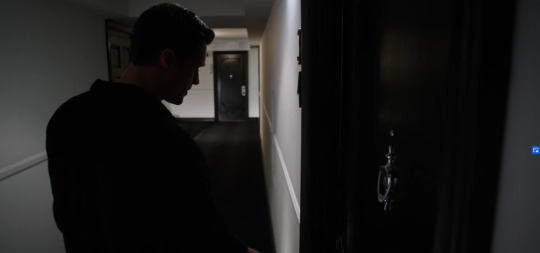
But then there’s May entering the shot at the far end of the hallway, and her motion and his turning to look at her frames her monochrome shape in this nice little white triangle between him and her door.
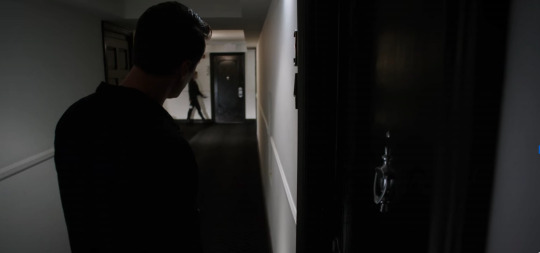
And there’s a tasty little rack focus that pulls the instant she passes in front of the door, making sure our attention is on her and the little white label of her bottle that really pops in the sea of black.
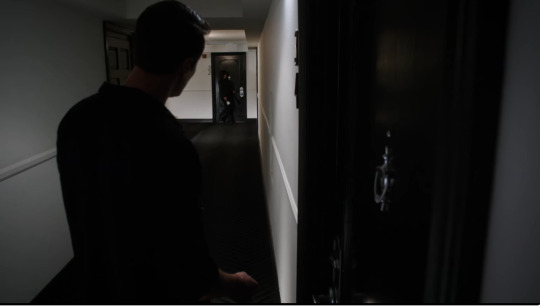
By this point in time, we’ve been shown, graphically, intimately, a dark shadow in his past, and we’ve been shown the physical and emotional toll its taken on him (an insight provided by the magic alien macguffin, btw). We haven’t been told anything, we experienced his experiences with him via the power of cinema. Her specific trauma is still a mystery at this point, but we’ve been given enough information to understand and appreciate its effects on her character. So not only can we sympathize with Ward now, we can sympathize with his empathy for May in this moment.
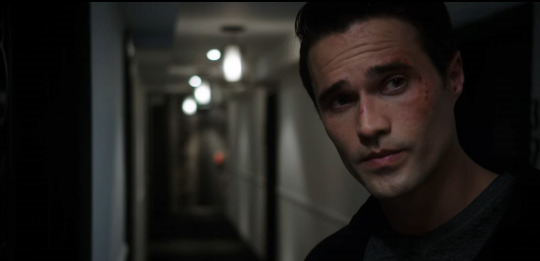
She catches him looking.
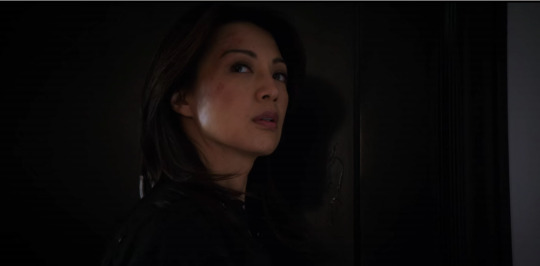
I mentioned micro expressions and screenshots do not do these performances justice. How does one catch in a single frame the millisecond that an eyebrow ticks in asking a silent question?
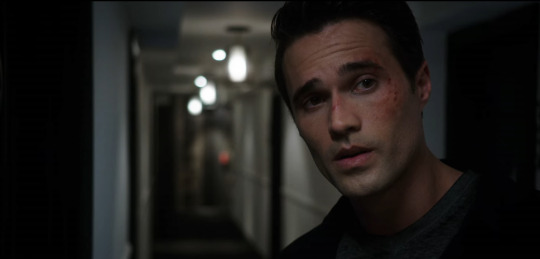
Typical for her, May’s answer is also communicated through body language.
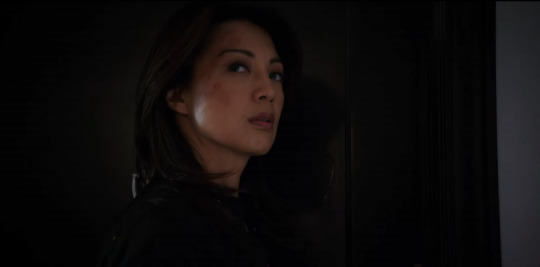
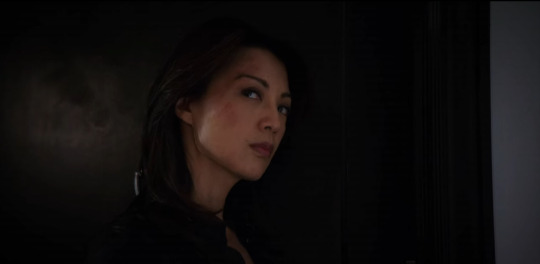
From that canted, inviting look, we pan down as she unlocks her door and enters. She passes through the frame and disappears inside, after giving us a reminder that her plans are to apply alcohol to her issues. (Remember that Ward turned down Skye’s invitation at a bar of all places)
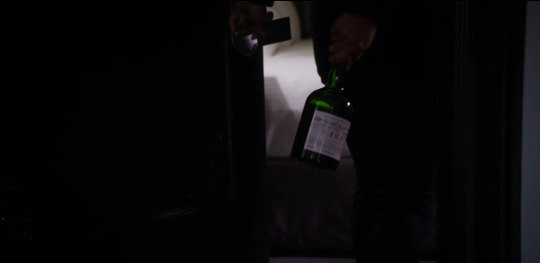
Oh, and what has our framing left us to contemplate? Is that a bed I see in there? (Remember that Ward turned down Skye’s invitation) Let me point out that this shot of just the bed after May walks by is on screen by itself for maybe a fraction of a second. Just a suggestion of a thing, really.
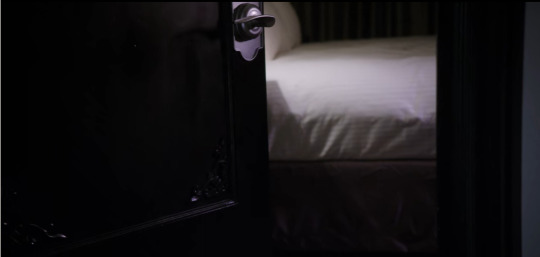
Ward contemplates.
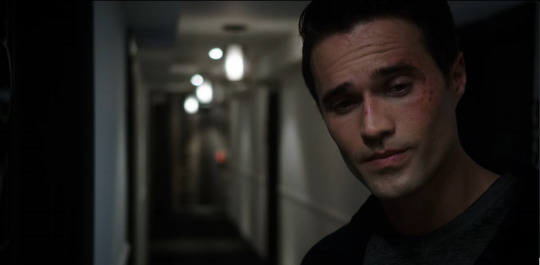
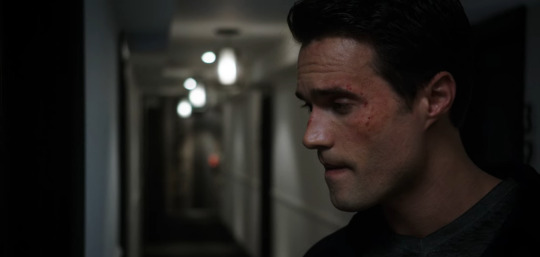
I love returning to this shot because it’s literally the same set up, and my instant reaction is that it’s another insert, a POV shot, and I fully expect to return to the single shot on Ward to discover his decision the second he makes it.

INSTEAD. Ward walks immediately into THIS FRAME, too, black-shape-on-white-shape in the same way May was introduced to this scene. And we stay here as he closes the door behind him ...
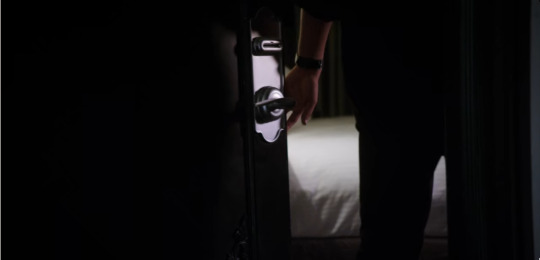
Letting us know everything we need to know without a single word needing to be spoken.
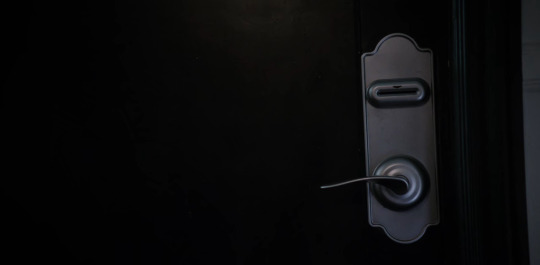
Another fraction of a frame dwelling on that shot and then immediately fade to black. Credits. Show’s over, folks.
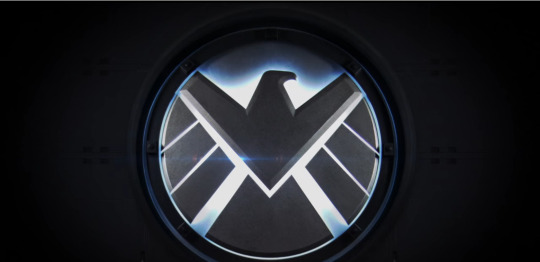
And not that there’s any particular meaning in it, but they were super careful to minimize what colors were allowed to appear in this sequence? Like there’s a particular sort of green in that weird armchair, which sort of matches the green-glass of her bottle. And there’s the red of the fire alarm fixtures which more or less matches the red of his, y’know, fresh facial wounds. EVERYTHING else (other than, I guess, their skin tones) falls somewhere along the white-black spectrum. NICE. BEAUTIFUL. I LIKE IT A LOT.
And the Netflix synopsis for this episode is “In the aftermath of the events chronicled in the feature film Thor: the Dark World, Coulson and the S.H.I.E.L.D. team try to pick up the pieces.” 1) I’m realizing that they literally go around picking up pieces of the rage-stick and that’s hilarious but mostly I mean to say 2) this MCU-tie-in episode could have met the brief being as vapid and non-impactful as that blurb makes it sound. But it took the opportunity to open up its characters for us to see their gooey insides, and hell they picked two of the best characters to dig into for this one, considering Ward’s tragic backstory plays as both a misdirect and actual inciting incident for his betrayal of SHIELD, and May’s tragic backstory feeds a couple of B-plots this season as well as being the major catalyst for a lot what happens in season FOUR. SEASON FOUR, PEOPLE. THE SEEDS ARE WAY BACK HERE IN SEASON ONE.
REMEMBER HOW THESE CHARACTERS WERE INTRODUCED THOUGH?? I DO, I JUST WATCHED THE PILOT LIKE YESTERDAY. WE MEET WARD FULLY ENSCONCED IN HIS GUISE OF SHIELD BADASS SUPERSTAR; HE IS LITERALLY ASKED TO EXPLAIN WHAT SHIELD MEANS TO HIM, AND WE GET TO HEAR THE FIRST OF HIS MANY LIES. WE MEET MAY IN HER OWN PERSONALLY-DESIGNED WHITE-COLLAR HELL, TURNING COULSON’S OFFER DOWN THE SECOND SHE HEARS HIS VOICE BECAUSE SHE’D RATHER STAPLE DOCUMENTS FOR ETERNITY THAN BE OUT IN THE FIELD WHERE SHE CAN MAKE ANOTHER MISTAKE LIKE THE ONE SHE CAN’T FORGIVE HERSELF FOR.
I’ve said it before and I’ll say it again. This show knows how to weave a character-driven story, and it’s done it for six seasons straight, juggling constantly evolving -- grounded, nuanced, impactful -- character arcs with the external factors (Thor: The Dark World, for one) that force certain narrative decisions.
(until they decide to ignore those factors altogether, lol, I’m looking at you, season 5, you wacky maverick you)
#agents of shield#aos#the well#grant ward#melinda may#a long rant about things I love#it's nice to rant about positive things for a change
15 notes
·
View notes
Text
what more can you do?
WOO! this week’s episode was sad and weird and badly paced and startlingly, unevenly mature in true titans fashion. i loved it (with reservations)! let’s talk about it in excruciating detail:
SPOILERS ahead.
1. i can’t say that i’m awfully thrilled about the show following up on a character’s literal suicide attempt by... not addressing said suicide attempt at all. maybe it’s the awkward way an entire episode’s worth of flashback was shoehorned in between the end of 2.07--where dick literally talked jason off the ledge while in the throes of a psychotic break of his own--and the beginning of this one, but it’s honestly not just bad storytelling, but irresponsible storytelling.
1.5. in a general sense, tho, the tableau at the beginning of the episode is so egregiously unfair--so shockingly, plainly one-sided, with a slump shouldered dick facing the world, only kory on his side, that it’s quite apparent that it’s the lowest these heroes can go. and i do think their individual reactions to dick’s confession provide an interesting insight into their characters. hank and dawn have been operating alone for so long, each a reminder of their traumas and losses and very human frailty to the other, without even the resources that dick and the batman enjoy. it’s been them v the world for so goddamn long; is it any wonder that they were looking for the first excuse to bail out of there, to not Deal with the idea that what they were doing to deal with their traumas and guilt was clearly not working, and dick was--and has been always--so willing to be the scapegoat? hank punching dick was utterly unwarranted--but i can accept that as part of the unaddressed emotional outbursts arising out of years of accumulated head injuries from both college football and vigilantism. (this isn’t to excuse what he did but to contextualise it within hank’s history and personality.) their instinct when facing ugly truths is to retreat to what they think is familiar and what they need--except, as hank realises later in the episode, that’s exactly what’s fucking them up further.
rose is understandably upset at being lied to about her brother’s death and the titans being complicit in the same--but i’m curious that her reaction was to merely leave and not try and fight them. maybe after being defeated by dick while sparring and nearly being killed by rachel she was sensible enough to realise that she couldn’t take them on all at once? i don’t know--she’s curiously been a bit of a cipher this season. jason leaving with her made sense tho--unburdened of the weight of being the team’s scapegoat, understandably miffed at dick for keeping a secret that nearly cost him his life and left him with a great deal of trauma, just Angry at the world in general, he gravitates towards rose, the only other outsider/rebel who tried to reach out to him when everybody else shunned him or looked at him like an impostor. i think the decision was more impulsive than anything--they still look confused and uncertain in the taxi as they leave the tower behind. but--i don’t know. theirs is the storyline that i’m the most perplexed about. we just don’t have a lot of information about either of them, rose especially.
(a part of me still thinks she’s slade’s mole in the tower. but why would she leave if she is? to keep up appearances bc to react in any other way to the news of her brother’s death would be suspicious? maybe she left because her job is done and the titans were splitting up? maybe she was part of the long game to seduce jason over to slade’s side--seeking revenge for dick swaying jericho over to the titans’? am i going to stop asking myself questions in this post? am i ever going to write a review that’s not just stream-of-consciousness nonsense? only time will tell.)
DONNA. oh, donna. her decision to leave seems to me a logical continuation of her s2 arc that i’d talked about in a previous review--paranoid, insecure, retraumatised, and taking out her frustrations on jason and dick. it’s also very interesting to me that she complained to rachel about dick treating them like “soldiers” and only told them things that he deemed that they “need[ed] to know.” it was because of jillian and whatever mysterious business that themyscira was conducting in sf that she and garth and slade ever landed up in that airport at all; even worse, jillian deemed it was something that donna didn’t need to know until it was too late. donna lost so much in that fiasco--the man she loved, her friends, several members of her amazon family, and her sense of purpose, her belief in her strength and her destiny and her faith that other people trusted her as a warrior and as a leader. she’s projecting all that pain onto dick--who again, doesn’t deserve all this shit but takes it anyway because of his own issues.
1.8. and, like. as much as jericho’s death became the Traumatic Event that overshadowed almost everything else in dick’s life for the last five years and helps explain a lot of his hang-ups right from s1, it just doesn’t have the same significance for the others. don’t get me wrong--i’m sure hank, donna and dawn are devastated and guilty about the part that they had to play in manipulating jericho and his eventual death. but their issues with each other, with the titans tower and with their past run deeper and in different directions, and i think all of that came into play when they each decided to go their separate ways.
1.95. idek what the fuck is going on with rachel. i felt every ounce of dick’s heartbreak and devastation when she got up to leave with donna. for all that she saved dick in the first episode of this season, she still hasn’t reached the point where she’s willing to unburden her emotions and issues on him. it must be frustrating and sad for her to realise just how much dick didn’t trust her either. but there’s something else going on as well: maybe she’s realised she has no real control over her re-emerging powers, and, carrying on with the fatalistic attitude she had at the end of 2.05, she wants to spare the titans the chaos and darkness that she carries around with her. (she’s used to running away at this point, after all.) she goes with donna bc donna knows her the least: it would therefore be easy to fool her and escape.
2. more faddei! and kory backstory! \o/
it’s curious that they never once bring up trigon, because s1 gave the impression that she’d come to earth with a specific mission to seek his portal out and destroy it before he could, y’know, Fuck The Universe Up. faddei makes it sound like kory just went on this fun little sabbatical before taking up royal duties, which kiiinda undercuts a lot of what was cool about her s1 arc. i realise you aren’t entirely happy with your freshman season, titans, and s2 looks like it might be a soft reboot, but you don’t have to mutilate it like this!
but seriously. the stakes just got upped exponentially for kory, and it would be really interesting to see where she goes from here. apart from a promise to rachel, she doesn’t really owe the rest of the titans anything--not that i think she views relationships in such transactional terms, of course. on the other hand, abandoning her responsibilities on tamaran has led to its takeover by an unfit leader and the deaths of several of her family and friends. the choice shouldn’t be a choice at all. she should go back home. and yet--she waited too long, and the choice has been taken away from her. faddei is dead, both of their ships are destroyed, and she is stuck on earth, grieving and frustrated and furious. kory is usually very clear headed about exactly where she stands emotionally, but after such a big event, she must be feeling so much pain, guilt, sorrow, anger, even resentment. it’s so easy to look at kory’s level-headedness and open, empathetic personality and use her to prop up other characters, but i hope that this isn’t always the case, and that she’ll be allowed to really work through these emotions while somebody else looks out for her.
2.35. (the little snippets of faddei and kory just enjoying the shit out of the Little Things that humanity has to offer is just... it filled me with so much warmth. i wouldn’t mind an entire episode of them just chilling and exploring and annoying each other with badly-applied out-of-context pop culture references)
2.5. blackfire! i don’t know much about comics!blackfire beyond “she was starfire’s sister, Evil, and possibly sold her sister into slavery??? yikes” so i’m just going purely off what the show has revealed about her so far. it was honestly disconcerting to see so many references to her possible disability (?) and to see both that and the efforts to accommodate her spoken about in... i want to say mocking way? i don’t know. i just saw a murder mystery/thriller movie today where the serial killer was revealed to have been both disabled from birth and mentally ill, and maybe i’m just feeling extra sensitive to the truly disturbing and pervasive trope of having disabled characters be Evil--and tying their Evil to their disability.
2.8. anyhow, blackfire appears to have accumulated a fair bit of power in the time that kory’s been gone: not only can she remotely possess other tamaraneans but she can blow up their ships too. (and didn’t faddei say that she had goons on the ground, looking for starfire?)
2.9. it’s a Lot to deal with this late in the season. maybe kory will leave for tamaran to deal with blackfire once and for all at the end of the season. and if titans ends up cancelled, wouldn’t that be a bittersweet ending.
(wherein ‘bittersweet’ translates to ‘devastating’ ofc)
3. oh where do i even start with dick
his worst fears came true. after his confession, not only did his old friends up and leave, but so did rachel and jason, which he found more heartbreaking than anything else. utterly consumed by guilt and convinced more than ever before of his culpability, he actively seeks out ways to self-flagellate, first by going to adeline to apologise, then by banishing himself, then by making sure he is punished (tho i have my doubts on that last one; will elaborate a little later). after watching him have an extended psychotic break and dash into not one but two suicide missions, watching dick grayson do this to himself feels like watching an extended feature on human suffering. it’s not fun, or pretty, and i can feel it reaching its nadir so that dick can bounce back up again, but i hope it happens soon.
(dick’s natural tendency to internalise guilt and responsibility into a hard little diamond core at his centre and his long training with batman with all the emphasis on secrets and subterfuge with a healthy underpinning of paranoia ironically means that he does so much goddamn emotional labour for this team. he’s the glue that keeps them together, that gives them purpose. he’s trying so hard to do good by everybody that he isn’t really able to achieve it with any of them, which leads to another self-flagellating spiral and him determining to try harder and the cycle just keeps going on. only kory seems to have ever broken this cycle, because she’s never demanded anything of him, nor he of her. it’s really sad to think how bereft dick feels right now, and more than that, how it’s stopping him from being there for the people who really do need him and trust him, like gar and rachel.)
3.25. adeline makes a very good point about how merely apologising doesn’t mean you’re owed forgiveness, and that seeking it out after all these years is a self-serving exercise in itself. but i can see dick taking it hard, especially after discovering that she’s letting slade--the man who actually killed her son--recuperate at her home. (and let’s be clear: however good her intentions, she participated in lying to her child about the truth of what his father actually does. wow, jericho was really just fucked over by pretty much every one he loved, wasn’t he?)
but i am glad to see dick isn’t so far gone that he takes the blame for jericho’s death in front of slade. he’s very aware that slade has permanently broken the team and very aware of the threat slade poses if they ever try to get back together again, but he’s not going to completely surrender every last shred of his self-worth and dignity to this man, and that was refreshing to see.
3.5. so he banishes himself to the farthest place he can think of with nothing more than the shirt on his back and a single duffel bag. it’s so over-the-top yet so... dick grayson.
3.8. BUT WAIT! ~PLOT TWIST~
ok so here’s what’s happening, all right? strap in:
a) jericho is one hundred percent inside slade. i have no doubts about this. adeline knows this too. it’s why she was so even-keeled while talking to dick, why she confidently said that jericho loved dick, and why she said “they” might be willing to forgive him. i’m thinking when slade crawled back home, jericho took advantage of his father’s momentary weakness to tell what was happening to his mother.
b) jericho tried to communicate to dick. i saw something somewhere which said that slade had gestured something very specific in asl while conversing with dick? i’m willing to believe that was intentional.
c) when dick was turning to leave and slade called him one last time and gave his “banishment sentence” jericho likely jumped bodies from slade to dick
d) so why did dick get himself arrested at the airport?
- dick was going through, as others have speculated, a dissociative episode. given how he’s exhibited signs of mental illness throughout this season this isn’t that far out of the realm of possibility, but it’s a weak and redundant narrative bridge and wasn’t shot in a way that suggested that it was a mental break. so i’m ruling this out.
- jericho took over. maybe he felt that this was the only way he could force dick to stay in sf. maybe some of his father’s anger/resentment leeched into him and he wanted to dick to experience some actual punishment instead of scarpering again. maybe he was overwhelmed by dick’s own self-flagellating tendencies and chose the shortest route to maximum pain. maybe it’s a combination of all three.
- dick finally got his brain into gear and realised at the last minute that jericho had possessed slade and was trying to tell him something. why he then proceeded to get himself arrested instead of running out of the airport is a mystery.
personally, i’m leaning towards the ‘jericho possessed dick’ possibility.
4. gar is such a sweetheart and i am so glad that he took centrestage this episode, even though, like always, it was to support another character and ended up with him crying and begging for help from an unresponsive dick. *sighs*
4.5. much like dick himself, he’s trying to do good by everybody, only to end up badly misjudging a situation, and all alone.
5. oof. this has gone on for far too long and i am Tired. more thoughts to come later, because right now my brain is as disorganised as... as disorganised as a titans episode. hah! self-burn!!!
#titans#titans spoilers#dick grayson#koriand'r#garfield logan#hank hall#dawn granger#donna troy#rachel roth#slade wilson#meta#aaaah this is 2.6k+ words long I'M SORRY
73 notes
·
View notes
Text
V’s After End - Where the Message Fails
So I have now gone through both the Forgive and Judge ends of V’s After Ending, and throughout my playthrough, there was something that I felt just wasn’t working. Now that I’ve completed the entirety of V’s After Ending (or shall I call it Rika’s After Ending, because that’s what it felt like), I want to talk about what makes this ending unsatisfactory.
Before I start, I just want to say that I still really appreciate Cheritz. I can see how hard they have worked on this game. They have tried hard to address certain issues and discuss messages they want to send. The way they handle these issues is very debatable and done poorly in ways, but considering this game is first and foremost made in South Korea where the issue of mental health has quite a ways to go, props to them for trying at least?
Some of the messages they were going for in this After Ending are interesting and can be valid in more minor scenarios. The thing is… I strongly believe they do not work in the context of Rika and what she has done.
Basically, this game makes you either forgive Rika and be sympathetic to her, or makes you feel bad and as if you are being cruel if you do not.
In the Forgive End, the blame for Rika’s actions is essentially not placed on her. The story puts the blame on her mental illness, as well as all the traumatising circumstances throughout her life. Through Yoosung reading up in a psychology textbook, he comes to the conclusion that what Rika did was not entirely wrong and that she didn’t do bad things on purpose, as her mental illness is what caused everything.
Because of this conclusion, Rika is not held accountable for her actions. At the end of this After Ending, Rika has learned to find happiness and goodness within herself, “becoming her own sun”, and is living her life. The only consequence of everything she has done in this game is that public perception of her is bad. The severe crimes she has committed are not dealt with, and she does not even face any legal consequences.
There is also a lot of discussion throughout the After Ending that questions whether justice is really something that is needed. Zen in particular continuously raises the point that it would be better for everyone’s own mental and emotional health, as well as their individual growth, to forgive what Rika has done, and not hold onto any negative emotions in their heart.
Now I see what Cheritz were trying to do with this After Ending. They want to send the message that holding grudges and hate within yourself hurts you. They want to point out that unless you understand the other person, you can’t really judge their actions as being wholly good or bad. Who decides good and bad, and who decides whether something is just?
Now these are some interesting questions, and I actually believe that this can be valid in certain scenarios, provided the scenario is not nearly as major as the one in this game. The entire message Cheritz tries to send in the After Ending falls apart when you look at what Rika has done.
Rika’s actions, that this game wants to forgive and not concern yourself with justice over, includes:
- Manipulating people around her to be extremely dependant on her,
- Physically abusing her partner, including purposefully blinding him, to make him prove his devotion to her,
- Taking many vulnerable people into a cult,
- Drugging and brainwashing said people,
- Raising a child to be exploited and carry out her will for her personal gain, breaking down this child and his worldview and his trust in people he loved so that he would turn against everyone else and be obedient to only her, while also forcefully drugging this child in the process,
- Attempted murder (stabbing V, making Saeran explode Magenta)
Not to mention that throughout the Another Story routes, she repeatedly denies any of these actions as being wrong, stating that it is needed, under her delusion that she needs to release her devil and it’s the only way these people can find Paradise. She was offered help many times, but she refused it and continued to do these awful things, justifying herself as she did so.
This game wants to treat judging Rika for all of that as if it is on the same level as judging someone for cutting you off in traffic.
But how can we possibly not view any of what she has done as bad? How can the game say that the concept of justice isn’t something that needs to be applied here? In what way does understanding her mindset diminish the seriousness of what she has done?
How can all of this be forgiven so easily, with the perpetrator getting away with it all and facing hardly any consequences?
Based on the original 5 routes and Secret Endings, I do not think this game originally set out to try to excuse Rika in this way. If it did, I think they would have made her actions much less extreme to start with. But since Rika has been getting more attention lately, and thus more fans and more demand for her happy ending has emerged, Cheritz is pushing for more sympathy for her now. Rika’s newly released backstory has added a number of new circumstances to further try to absolve Rika of blame for her future actions and elicit greater audience sympathy for her in order to do so. However, while mental illnesses and a traumatic past and life can be an explanation, they are not a justification for everything that Rika has done.
In addition to all of this, forgiveness is portrayed as something that must be done in order for everyone to get the best possible outcome. The Choi Twins’ plot with their father is dealt with and resolved and they get their long awaited happy reunion, and MC and V get married and raise a child together.
The Judge End aims to create a sense of discomfort among all the characters because Rika was not forgiven. Luckily, the end wasn’t so bad that it prevented the Choi twins from reuniting or from V and MC remaining together (although they do not get married in this end). However, characters are still portrayed as being unhappy, and regretful over what has happened with Rika (who ends up in a coma) and feeling as if they did not make the right choice nor did they get closure.
The Judge End also really tries to hammer in the idea that the player is being too harsh. They include a dream sequence consisting of Rika being beaten down by every character, stating that everything that has happened throughout her life is deserved. The ending makes it seem that since you didn’t want to forgive Rika, then you must want her to be forever suffering, being hated by everyone in the world and only existing in complete hopelessness by being a shell that lives in her own self-isolation and darkness. You as the player are made out to be cruel for inflicting this end upon Rika for not forgiving her.
This entire After Ending would have worked better if it tried a more balanced approach between these two ends, instead of forcing a message onto the player that should not be applied to a case as extreme as Rika’s. Instead of one end resulting in Rika getting away scot-free and the other with her being dead inside, perhaps they could have allowed for Rika to face the proper consequences of what she did without everyone being made to feel bad about it? Maybe letting the player hope for Rika to be better and find inner peace, but not actually needing to forgive her in order for that to happen?
The message that victims of serious harm will only find peace if they forgive and don’t concern themselves with the idea of justice is a harmful one. The idea that mental illness and life circumstances take the blame away from an individual’s severe actions is false.
I can only hope that Saeran’s eventual After Ending does not follow the same direction as this one.
#mystic messenger#v after ending#v after end#jihyun kim#mysme#mm spoilers#v route spoilers#i played these routes until like 1am#and then i wrote this and now it's 3am#this is my first time writing something like this on tumblr#long post#mm v#my post
1K notes
·
View notes
Text
okay okay, Black Eagles/Crimson Flower. this is very long and very rambly bc i was mad and i probably repeat myself a lot but whatever
keep in mind going forward that this was my FE3H first route and the only one i've played so far, and it was... disappointing. i really, really want to like Edelgard as a character bc she seems interesting and she has so much potential, but fact is the game never allows her any sort of true depth, and never lets you interact with her in any meaningful way
and i hate to say it bc i ALWAYS go to bat for complex underappreciated female characters, which is what i was expecting out of this, but that's not... even what she is. none of her potential is ever realized. she's one-note and static and the writers seem to think that just throwing in a traumatic backstory (that never gets explored, even as it very obviously relates directly to her worldview) and a few cute/quirky character moments will give her depth, but it doesn't
the game really LOVES to try and play up this special bond between Edelgard and Byleth and how much Byleth means to her, but it never feels earned. she always says that she feels like she can tell Byleth anything and everything, but she doesn't. i have no better understanding about why she felt like she needed to do the things she did than i did at the end of part 1. all she ever says is that she has to do it all in the name of her ideals and a better future and it's the only way, and all i ever wanted throughout the entire route was to ask WHY ? WHY is this the only way ? WHY do you feel like this is the only thing you can do ? WHY are all other options off the table ?
she's cooperating directly with Those Who Slither In The Dark (TWSITD), who not only experimented on and tortured Edelgard herself and killed her siblings, but also killed Byleth's father, but we never explore the implications of that. hell, Edelgard's issues aside, Byleth themself has their own stake in this, their own very good reasons to question Edelgard and the lengths she's willing to go to in order to achieve this future of hers, but they're NEVER given the chance. if you choose her route, the game apparently assumes that you've decided to follow her without question or reserve, regardless of everything that happened, even though it makes no sense in context. at the end of the route, Edelgard even admits that she couldn't understand why Byleth wound up taking her side, and i wanted to SCREAM !!! LIKE YEAH, I DON'T UNDERSTAND IT EITHER ??? i was HOPING we would get to explore that at some point but I GUESS NOT ????
at most, Edelgard offers platitudes by saying that she too hates TWSITD and regrets everything they've done but still maintains that her alliance with them is necessary for the time being, because they are the best allies she has against the church, and she needs their strength. again, my question is: WHY ? because while i can see how they may have been useful to her in part 1, i didn't see them do ANYTHING to help her during the entirety of part 2. they had literally zero presence in any of the battles, were not even shown or mentioned aside from the moments where they were being CLEARLY ANTAGONISTIC towards her, like when they NUKED ARIANRHOD AS A "WARNING" as soon as Edelgard captured the city bc they were mad she killed one of their officers,
and yet she felt like she needed to spin the story to say it was the church's doing so as to like, save face and rally morale while maintaining their alliance, i guess, but why ?** even in the FINAL BATTLE AGAINST RHEA HERSELF, Arundel shows up ONLY to literally say "yeah i'm just here to watch lmao". so like, as far as i know from everything i have physically seen, we defeated the church without their help at all--in SPITE of their "help", even--which does not help me understand why her alliance with TWSITD is so necessary that Edelgard has to just grit her teeth, bear it, and cover for them until the war is over so that she can finally turn on them
(**i get not telling the entire army about Arianrhod to avoid panic and questions, but what was the point of lying to the rest of the Black Eagles ? why is it that Byleth, Edelgard, and Hubert seem to be the only ones allowed to know about the empire's workings with TWSITD ? like what was even the point of Edelgard revealing herself as the Flame Emperor at the end of part 1 ((which was also a totally botched scene but i'm not even gonna get into that here))? i thought the reason for that scene WAS to reveal the truth to everyone that she was working with TWSITD, we even had that whole dramatic battle where Edelgard had to fight her own house and professor bc of it ? but i guess it wasn't, bc none of them ever bring it up again, and the game still treats it like they should all still be in the dark about it, so ???)
on top of that, i still don't understand why she felt like she needed to antagonize the Alliance, or even the Kingdom, when her enemy is the church. like i get it, there’s no negotiating with the church as it is, violent conflict with them is inevitable and i’m not against that, i understand it and i can get behind it. but why didn't she ever try talking to the other two factions or working together w them or FORGING ALLIANCES instead of resorting immediately to violence ?** maybe i can believe that Dimitri and the Kingdom are a lost cause, but for example--and again now i haven't played the GD route, but from what i understand-- Claude's values are fairly similar to Edelgard's, and he does a lot of digging into the church on his own and is able to discover much of the truth. her alliance with TWSITD is apparently "necessary" but it never occurs to her to reach out to GOOD PEOPLE like Claude who would share her interests ? why ? why can’t we even bring it up ?
(**my confusion with this is best summed up by that one interaction she has with Dimitri in part 2, where before they're about to fight, he asks her, "Must you continue to conquer? Continue to kill?" and her response is literally, "Must you continue to reconquer? Continue to kill in retaliation?" like WHAT ? WHAT KIND OF CHILDISH "NO U" NONSENSE IS THAT ? YOU'RE LITERALLY THE AGGRESSOR HERE, ARE YOU REALLY TRYING TO TELL HIM HE SHOULD'VE JUST SAT BACK AND LET YOU TAKE THE KINGDOM WITHOUT EXPLAINING ANYTHING ? HE'S TRYING TO REACH OUT TO YOU, WHY DO YOU ALWAYS REFUSE TO GIVE HIM A STRAIGHT ANSWER. WHY ARE YOU BEING SO OBTUSE ABOUT THIS. WHAT IS THE REASON)
this isn't even getting into the fact that it becomes very obvious that Edelgard does not have the whole story behind the church and TWSITD, but there's no way to call that into question either. from what i understand from a few spoilers i've been given, she even gets some parts of the story flat-out wrong. this is The Story that she uses to justify all her actions, to herself and to others, and yet she's clearly missing key details, but we never get to question it, or investigate it further, or do anything about it
and what makes it suck extra is that, as i said, i really wanted so, so badly to love Edelgard. i wanted that bond between her and Byleth to feel real, and earned, and substantial. i wanted to work together and interact with her, to understand her, bc i genuinely sympathize with her goals. let’s erase inequality, abolish the nobility, destroy the crest system that sustains it, and tear down an oppressively intolerant religious institution ? hell yes sign me up bitch !!!! i don't like that we can't GUIDE her in her pursuit of that, or at least even try to understand why she's so committed to this horrific warpath she's on. bc why else would i have chosen to join her side and play her route ? why else is Byleth there, as her teacher ?
or maybe i'm not even supposed to sympathize with her or her cause, but they never make that point either ! like let's ignore what i want and entertain the notion that perhaps Edelgard's meant to be seen as clearly, dangerously radical and beyond all reason, that her route is supposed to be as close to a "bad" route as this game gets and you're supposed to feel guilty for helping her. i mean there definitely are points that made me go “uh, hey, what we’re doing here is kind of terrible”. the thing is they could've easily made that point at any time during her route, had moments where they highlighted the destruction left in Edelgard's wake as she "carves a bloody path" to her future with Byleth by her side, had her experience some kind of consequence for her actions or a "falling from grace" moment, exposed all the flawed logic behind her actions and examined how she came to be the way she is--but nothing like that ever happens. it’s just like “hooray we successfully invaded and conquered an independent nation :) on to the next one !” even in the epilogue, there's no downside to helping her win, no sort of realistic consequence like, idk, malcontent spreads, people aren’t happy that Edelgard took over their nation by force despite the reforms, riots flare up, etc etc., nothing that asks the player to stop and think about all this. they play everything straight but then refuse to give it meaning or make sense of any of it
and there's PLENTY of ways to make sense of it. even i can imagine some potential in-universe explanations to a lot of the "why" questions i have about Edelgard--why does she preemptively isolate herself from everyone that hasn't already demonstrated unconditional allegiance to her, why does she refuse to seek other allies or reach out to her peers like Dimitri or Claude for help and yet continue to associate with the dangerous group that is the source of her trauma, why does she rightly question one narrative while she never thinks to question the other, why does she resort to violence so quickly and easily even as she laments it, etc etc. the problem is that *the game itself* doesn't even THINK to try and address any of this, and so it's never able to make a point about any of it
so yeah, the point COULD'VE BEEN that she is too stubborn, too far gone, too caught up in her own narrative to comprehend that her actions are not as necessary as she thinks they are, too self-righteous to see the parallels between herself and Rhea as she needlessly sacrifices countless lives for her cause while she claims that HER life is too important to lose, too stuck in her own head to see the hypocrisy in her denouncement of the nobility and church and their treatment of the masses while SHE, Miss Imperial Royalty herself, throws others' lives away for her war--BUT the point is never made !! there's no statement from that point of view either ! there is literally no message ! Edelgard goes through no character development, positive or negative, despite all the groundwork for it being laid out plainly. she does not get a chance to grow, nor does she ever regress, nor is she ever faced with the consequences of her actions, and so no statement is ever made about her character or anything she represents
all the potential was there for Crimson Flower to have been a really good story, and that's why i'm so frustrated that i'm writing an essay about it. and it didn't HAVE to be a positive one with a happy ending, or even a mixed, bittersweet one, which i think would've been best. it easily could've been a tragic story about like, Byleth witnessing the fall of their misguided student firsthand as they try and fail to reach out to her, powerless to save her from herself as she drifts away from everybody, being forced into a position where her death becomes necessary in order to preserve the lives of others, or something--but it didn't try to do anything like that. it didn't try to do ANYTHING ! in fact, i would say her character is much more compelling in all the other routes where she DIES, if only bc at least then it feels like SOMETHING is being said about her character
the real kicker is that, at the end of Crimson Flower, it's said that Edelgard goes on to abolish the nobility, and yet in the epilogue she remains the emperor, and all your other units of noble birth still...... have noble titles and landholdings. not to mention i can't even be sure if the scene where Byleth's crest disappears is supposed to represent the disappearance of all crests, or just Byleth's ? so like i don't actually know what i'm supposed to think Edelgard accomplished ? what was the point of mindlessly helping her commit war crimes ? if not a character arc, or a plot resolution, or some greater message, or even the world state i was promised to get from siding with her, what exactly am i supposed to get out of this route ???
i keep thinking about how it feels in contrast to her progression in every other route, and to how Dimitri is written. bc when Byleth joins anyone else, Edelgard always dies, as Dimitri does. but unlike with Dimitri, intsys didn't adapt Edelgard's progression to Byleth's presence, beyond the simple facts of whether she wins/loses and lives/dies. what i’ve gathered from the other routes is that they portray her as a senselessly violent, incomprehensible, self-righteous kid with too much power who became consumed by it and then dies/is killed as a natural consequence of her own actions. i was expecting the difference in her route to be that we get to explore her side more and understand her inner workings and what could have led her down this path, and then to either get the chance to make a difference, or to be dragged down with her as a cautionary tale. but she STILL comes across as senselessly violent, incomprehensible, self-righteous and power-trippy, except now i get to enable her, and that’s presented as like, a genuinely wholesome thing ?
my gf has said that it feels like you're not meant to side with Edelgard, just from how poorly written and constructed her entire route is**, and i've been getting the same feeling. having finished it, the whole thing felt hollow. her actions and choices always feel absurd and frustrating because we never get any insight into what she's thinking, there's too much Telling and not enough Showing to back up any of the Telling, there are so many aspects of the route that don't make sense, and there's no ATTEMPT to make them make sense
(**seriously the production value felt so low at times that it got embarrassing to watch. like after part 1, Jeritza just dropped off the face of the planet with no explanation, and no one in the game ever brought him up again or even wondered where he was, not even Edelgard. then the recent game update suddenly added him to my roster right before i was about to finish the route, again with no explanation, and no in-game acknowledgement of this. which can only lead me to believe that Jeritza was actually SUPPOSED to be there the whole time but intsys.... forgot about him ? LIKE... THEY FORGOT TO WRITE THE DEATH KNIGHT INTO EDELGARD'S ROUTE ? WHAT)
in fact, it feels to me a lot like death was always the intended resolution for her character and everything was always written around that, but then they decided that wasn't an appropriate tone/direction to take for a route in which Byleth joins her, but then they weren't even bothered to really revise the route in any meaningful way so they just went "fuck it" and gave us.... whatever this mess is. but if so, if intsys really was so set on having her be this tragic misguided villain, i don't understand why they didn't commit to that narrative in her route as well, instead of just half-assing everything and doing nothing meaningful and wasting my time. hell i don't understand why they even bothered to include an Edelgard route if their hearts clearly weren't in it to begin with. just let her be the villain that you guys obviously wanted her to be and go
but, whatever. at least all the OTHER Black Eagle characters were great
#blog chatter#fe3h chatter#fe3h spoilers#feel free to chime in with thoughts or to fill in any missing information or whatever
13 notes
·
View notes